广东省东莞市万江中学,石龙中学,常平中学三校联考2023-2024学年高二上学期11月期中英语试题
2023-2024学年广东省东莞市万江中学 石龙中学等学校高一上学期三校联考化学试题
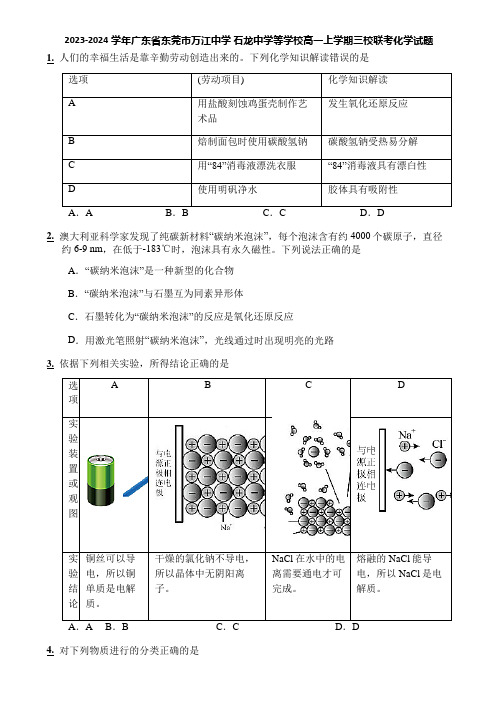
2023-2024学年广东省东莞市万江中学石龙中学等学校高一上学期三校联考化学试题1.人们的幸福生活是靠辛勤劳动创造出来的。
下列化学知识解读错误的是2.澳大利亚科学家发现了纯碳新材料“碳纳米泡沫”,每个泡沫含有约4000个碳原子,直径约6-9 nm,在低于-183℃时,泡沫具有永久磁性。
下列说法正确的是A.“碳纳米泡沫”是一种新型的化合物B.“碳纳米泡沫”与石墨互为同素异形体C.石墨转化为“碳纳米泡沫”的反应是氧化还原反应D.用激光笔照射“碳纳米泡沫”,光线通过时出现明亮的光路3.依据下列相关实验,所得结论正确的是实验装置或观图实铜丝可以导干燥的氯化钠不导电,NaCl在水中的电熔融的NaCl能导4.对下列物质进行的分类正确的是A.酸性氧化物都是非金属氧化物B.CuSO 4 ·5H 2 O属于纯净物C.凡能电离出H +的化合物均属于酸D.盐类物质一定含有金属阳离子5.下列化学用语正确的是A.碳酸氢钠在水中的电离方程式:NaHCO 3 =Na + +H + +B.氯气和石灰乳反应制备漂白粉的离子方程式:C.钠与水反应的化学方程式:2Na+2H 2 O=2NaOH+H 2↑D.氯气与水反应的离子方程式:6.菜谱中记载:河虾不宜与西红柿同食。
主要原因是河虾中含有+5价砷,西红柿中含有比较多的维生素C,两者同食时会生成有毒的+3价砷。
下列说法不正确的是A.维生素C具有还原性B.上述过程中砷元素发生还原反应C.上述过程中+5价砷类物质作氧化剂D.上述过程中+3价砷类化合物是氧化产物7.下列各组离子一定能大量共存的是A.在透明溶液中:Na +、Cu 2+、Cl -、B.在含大量Ba 2+的溶液中:Na +、K +、、OH -C.在强碱溶液中:Na +、K +、、D.滴加紫色石蕊溶液显红色的溶液中:K +、Na +、Cl -、8.下列物质间的转化中,不能一步实现的是A.Na 2O→NaOH→NaClO B.Cl 2→HClO→CO 2C.Na 2 CO 3→NaHCO 3→NaCl D.Na→Na 2 O 2→NaOH9.钠和氯及其化合物与生活、生产密切相关,下列说法不正确的是A.小苏打可用于治疗胃酸过多B.氯气可以使鲜花褪色C.工业上可以利用H 2和Cl 2直接化合制成HCl,若HCl发生泄漏,车间里将会弥漫白烟D.钠着火时不可用泡沫灭火器灭火,应用干燥的沙土来灭火10.下列装置完成相关实验,合理的是排空气收集法制备氢氧化铁胶除去粗盐水中的比较Na CO 和NaHCO 热11.某课外小组为了鉴别和两种白色固体,设计了如下几种实验方法。
2023-2024学年广东省东莞市万江中学高二上学期第二次月考(1月)数学试题
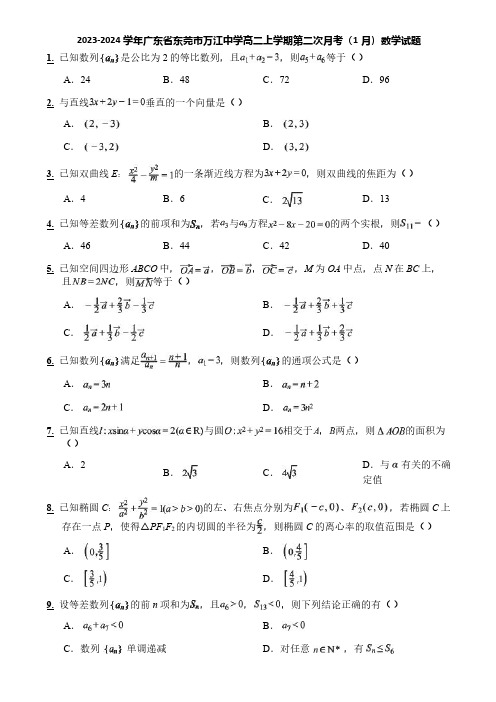
2023-2024学年广东省东莞市万江中学高二上学期第二次月考(1月)数学试题1.已知数列是公比为2的等比数列,且,则等于()A.24B.48C.72D.962.与直线垂直的一个向量是()A.B.C.D.3.已知双曲线E:的一条渐近线方程为,则双曲线的焦距为()A.4B.6C.D.134.已知等差数列的前项和为,若与方程的两个实根,则()A.46B.44C.42D.405.已知空间四边形ABCO中,,,,M为OA中点,点N在BC上,且,则等于()A.B.C.D.6.已知数列满足,,则数列的通项公式是()A.B.C.D.7.已知直线与圆相交于,两点,则的面积为()A.2B.C.D.与有关的不确定值8.已知椭圆C:的左、右焦点分别为、,若椭圆C上存在一点P,使得△PF1F2的内切圆的半径为,则椭圆C的离心率的取值范围是()A.B.C.D.9.设等差数列的前n项和为,且,,则下列结论正确的有()A.B.C.数列单调递减D.对任意,有10.若方程所表示的曲线为,则下面四个命题中正确的是()A.若为椭圆,则B.若为双曲线,则或C.曲线可能是圆D.若为椭圆,且长轴在轴上,则11.已知空间三点,设.则下列结论正确的是()A.若,且,则B.和的夹角的余弦值C.若与互相垂直,则的值为2;D.若与轴垂直,则,应满足12.如果一个人爬楼梯的方式只有两种,一次上一级台阶或一次上两级台阶,设爬上级台阶的方法数为,则下列结论正确的有()A.B.C.D.13.若直线与直线平行,则______.14.已知圆与圆内切,则______.15.设等差数列的前n项和为,且,,则______.16.如图,在三棱柱ABC-A1B1C1中,所有棱长均为1,且AA1⊥底面ABC,则点B1到平面ABC1的距离为______.17.已知抛物线过点,焦点为F.(1)求抛物线C的方程;(2)求过点P且与抛物线C有且仅有一个公共点的直线l的方程.18.已知数列是正项等比数列,数列满足.(1)证明:数列是等差数列;(2)若,,设数列和中的所有项按从小到大的顺序排列构成数列,记数列的前项和为,求19.已知数列的前n项和为,且满足.(1)求的通项公式;(2)设,求数列的前20项和.(化简后的结果可保留指数形式)20.已知等差数列和正项等比数列满足:,,.(1)求数列的通项公式;(2)记,数列的前项和为,求.21.已知三棱锥(如图一)的平面展开图(如图二)中,四边形为边长等于的正方形,和均为正三角形,在三棱锥中:(1)证明:平面平面;(2)若点M在棱上运动,当直线与平面所成的角最大时,求平面与平面所成锐二面角的余弦值.22.已知椭圆的短轴长为2,点在椭圆上,与两焦点围成的三角形面积的最大值为.(1)求椭圆的标准方程;(2)当为椭圆的右顶点时,直线与椭圆相交于两点(异于点),且.试判断直线是否过定点?如果过定点,求出该定点的坐标;如果不过定点,请说明理由.。
广东东莞一中、东莞实验中学等三校2024年高二下学期联考化学试题+答案
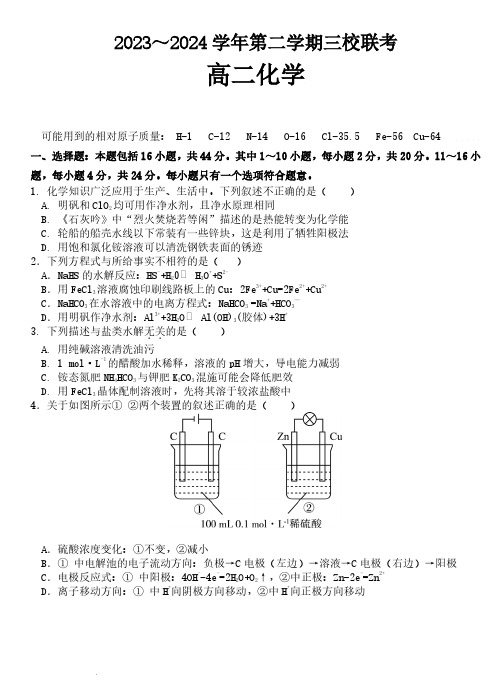
2023~2024学年第二学期三校联考高二化学可能用到的相对原子质量: H-1 C-12 N-14 O-16 Cl-35.5 Fe-56 Cu-64一、选择题:本题包括16小题,共44分。
其中1~10小题,每小题2分,共20分。
11~16小题,每小题4分,共24分。
每小题只有一个选项符合题意。
1. 化学知识广泛应用于生产、生活中。
下列叙述不正确的是()A. 明矾和ClO2均可用作净水剂,且净水原理相同B. 《石灰吟》中“烈火焚烧若等闲”描述的是热能转变为化学能C. 轮船的船壳水线以下常装有一些锌块,这是利用了牺牲阳极法D. 用饱和氯化铵溶液可以清洗钢铁表面的锈迹2.下列方程式与所给事实不相符的是()A.NaHS的水解反应:HS-+H20 H3O++S2-B.用FeCl3溶液腐蚀印刷线路板上的Cu:2Fe3++Cu=2Fe2++Cu2+C.NaHCO3在水溶液中的电离方程式:NaHCO3 =Na++HCO3—D.用明矾作净水剂:Al3++3H2O Al(OH)3(胶体)+3H+3. 下列描述与盐类水解无关..的是()A. 用纯碱溶液清洗油污B. 1 mol·L-1的醋酸加水稀释,溶液的pH增大,导电能力减弱C. 铵态氮肥NH4HCO3与钾肥K2CO3混施可能会降低肥效D. 用FeCl3晶体配制溶液时,先将其溶于较浓盐酸中4.关于如图所示① ②两个装置的叙述正确的是()A.硫酸浓度变化:①不变,②减小B.① 中电解池的电子流动方向:负极→C电极(左边)→溶液→C电极(右边)→阳极C.电极反应式:① 中阳极:4OH--4e-=2H2O+O2↑,②中正极:Zn-2e-=Zn2+D.离子移动方向:① 中H+向阴极方向移动,②中H+向正极方向移动5.下列变化与勒夏特列原理无关的是()A.红棕色的NO2体系加压后,颜色先变深后逐渐变浅B.将0.01mol/LFeCl3溶液加热,溶液的颜色加深C.在配制硫酸亚铁溶液时往往要加入少量铁粉D.加热蒸干AlCl3溶液不能得到无水AlCl36.在恒容密闭容器中发生下列化学反应:4NH3(g)+6NO(g) 5N2(g)+6H2O(l) ΔH<0下列有关说法正确的是()A. 其他条件不变,使用高效催化剂,废气中氮氧化物的转化率增大B. 平衡时,其他条件不变,增加NH3的浓度,废气中NO的转化率减小C. 单位时间内生成NH3和H2O的物质的量之比为2∶3时,反应达到平衡D. 平衡时,其他条件不变,升高温度可使该反应的平衡常数增大7.金属钯的一种离子[PdCl4]2-可催化合成H2O2,反应过程如图所示。
广东省东莞市两所中学2023-2024学年高二上学期11月联考语文试题(含答案)
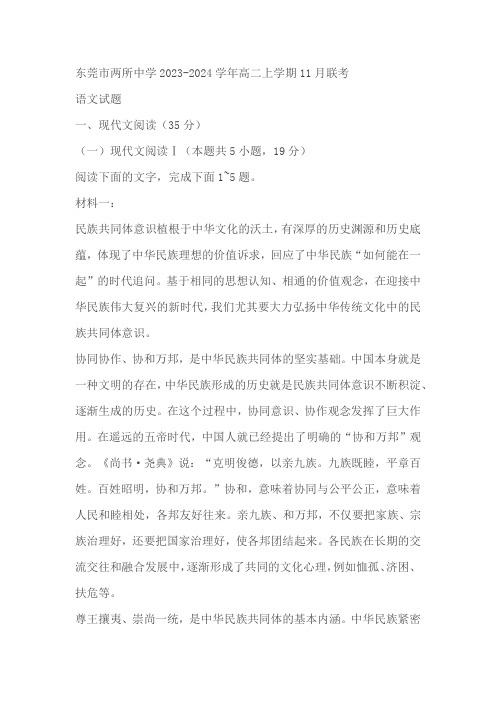
东莞市两所中学2023-2024学年高二上学期11月联考语文试题一、现代文阅读(35分)(一)现代文阅读Ⅰ(本题共5小题,19分)阅读下面的文字,完成下面1~5题。
材料一:民族共同体意识植根于中华文化的沃土,有深厚的历史渊源和历史底蕴,体现了中华民族理想的价值诉求,回应了中华民族“如何能在一起”的时代追问。
基于相同的思想认知、相通的价值观念,在迎接中华民族伟大复兴的新时代,我们尤其要大力弘扬中华传统文化中的民族共同体意识。
协同协作、协和万邦,是中华民族共同体的坚实基础。
中国本身就是一种文明的存在,中华民族形成的历史就是民族共同体意识不断积淀、逐渐生成的历史。
在这个过程中,协同意识、协作观念发挥了巨大作用。
在遥远的五帝时代,中国人就已经提出了明确的“协和万邦”观念。
《尚书·尧典》说:“克明俊德,以亲九族。
九族既睦,平章百姓。
百姓昭明,协和万邦。
”协和,意味着协同与公平公正,意味着人民和睦相处,各邦友好往来。
亲九族、和万邦,不仅要把家族、宗族治理好,还要把国家治理好,使各邦团结起来。
各民族在长期的交流交往和融合发展中,逐渐形成了共同的文化心理,例如恤孤、济困、扶危等。
尊王攘夷、崇尚一统,是中华民族共同体的基本内涵。
中华民族紧密团结,是因为有强大的向心力、凝聚力。
向心力来自共同遵循的“道”,“道”就是王道,就是尊王攘夷;凝聚力来自内心的“统”,这个“统”就是正统,就是崇尚一统。
从孔子作《春秋》开始,“大一统”的观念就日渐深入人心。
“大一统”的表述最早见于《公羊传·隐公元年》,其中解释《春秋》所言“王正月”说:“何言乎王正月?大一统也。
”徐彦疏:“王者受命,制正月一统天下,令万物无不一一皆奉之以为始,故言大一统也。
”所谓“大一统”就是以一统为大,其中的“大”是重视、尊重。
“大一统”就是“尊王”,就是尊王道、抑霸道,就是天下诸侯皆统系于王。
“大一统”不是强调所统辖疆域的辽阔,而是指国家政治、经济制度与思想文化上的集中。
2023-2024学年广东省东莞市万江中学高二(下)三校联考物理试卷+答案解析
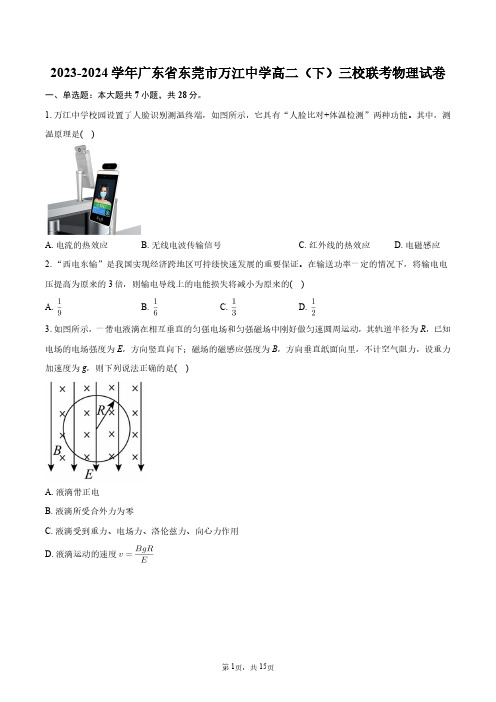
2023-2024学年广东省东莞市万江中学高二(下)三校联考物理试卷一、单选题:本大题共7小题,共28分。
1.万江中学校园设置了人脸识别测温终端,如图所示,它具有“人脸比对+体温检测”两种功能。
其中,测温原理是()A.电流的热效应B.无线电波传输信号C.红外线的热效应D.电磁感应2.“西电东输”是我国实现经济跨地区可持续快速发展的重要保证。
在输送功率一定的情况下,将输电电压提高为原来的3倍,则输电导线上的电能损失将减小为原来的()A. B. C. D.3.如图所示,一带电液滴在相互垂直的匀强电场和匀强磁场中刚好做匀速圆周运动,其轨道半径为R,已知电场的电场强度为E,方向竖直向下;磁场的磁感应强度为B,方向垂直纸面向里,不计空气阻力,设重力加速度为g,则下列说法正确的是()A.液滴带正电B.液滴所受合外力为零C.液滴受到重力、电场力、洛伦兹力、向心力作用D.液滴运动的速度4.如图所示,把一根柔软的弹簧悬挂起来,使它的下端刚好和槽中的导电液接触,按图示连接电路,通电后,会看到弹簧上下跳动,关于这个现象,下列说法正确的()A.弹簧上下跳动的原因是通电后弹簧受到电场力B.将电源的正、负极对调一下,弹簧的跳动现象将消失C.将滑动变阻器的滑片向右移动时,弹簧将跳动得更加明显D.若换一劲度系数更小的弹簧,保持其他因素不变,则弹簧将跳动得更加明显5.某种感温式火灾报警器如图1所示,其简化的工作电路如图2所示。
变压器原线圈接电压有效值恒定的交流电源。
副线圈连接报警系统,其中为热敏电阻,其阻值随温度的升高而减小,为滑动变阻器,为定值电阻。
当警戒范围内发生火灾,环境温度升高达到预设值时,报警装置图中未画出通过检测的电流触发报警。
下列说法正确的是()A.警戒范围内出现火情时,副线圈两端电压减小B.警戒范围内出现火情时,原线圈输入功率变小C.通过定值电阻的电流过高时,报警装置就会报警D.若要调低预设的报警温度,可增大滑动变阻器的阻值6.如图甲所示,一条南北走向的小路,路口设有出入道闸,每侧道闸金属杆长L,当有车辆通过时杆会从水平位置以角速度匀速转动直到竖起。
广东省东莞市石龙中学等三校2024-2025学年高一上学期期中考试数学试卷

A.
1 b
<
b
1 -
a
B. ab > b2
C.1+ ab < a + b
D.
1 a
<
1 b
7.已知函数
f
(x)
=
-2
æ çè
1 2
ö|x| ÷ø
+
a
,其图象无限接近直线
y
= 1但又不与该直线相交,则
f
(x)
>
1 2
的解集为(
)
A. (-¥, -2) U (2, +¥)
B. (-2, 2)
C. (-¥, -1) U (1, +¥)
B.11
C.18
D.21
4.函数 y = x2 - bx + c 的零点为 1,2,则不等式 x2 - cx - b > 0 的解集为( )
A.{x | -1 < x < 3}
B.{x | x < -3 或 x > 1}
C.{x | x < -1或 x > 3}
D.{x | -3 < x < 1}
5.如图的曲线是幂函数
(1)求 A U B , A Ç B , ðR A ; (2)若 A Í C ,求 a 的取值范围.
( ) 16.(1)求值:
0.25-
1 2
-
-2 ´160
2
´
æ ç
2-
2 3
ö3 ÷
+
3
2
æ ´ç
4-
1 3
ö-1 ÷
;
èø
èø
1
(2)已知 a 2
广东省东莞市石龙中学等三校2024-2025学年高一上学期期中考试数学试卷
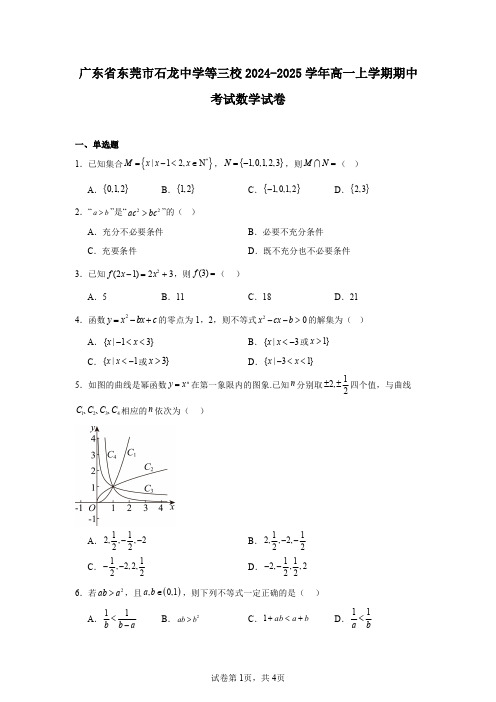
广东省东莞市石龙中学等三校2024-2025学年高一上学期期中考试数学试卷一、单选题1.已知集合{}*|12,N M x x x =-<∈,{}1,0,1,2,3N =-,则M N = ()A .{}0,1,2B .{}1,2C .{}1,0,1,2-D .{}2,32.“a b >”是“22ac bc >”的()A .充分不必要条件B .必要不充分条件C .充要条件D .既不充分也不必要条件3.已知2(21)23f x x -=+,则(3)f =()A .5B .11C .18D .214.函数2y x bx c =-+的零点为1,2,则不等式20x cx b -->的解集为()A .{|13}x x -<<B .{|3x x <-或1}x >C .{|1x x <-或3}x >D .{|31}x x -<<5.如图的曲线是幂函数n y x =在第一象限内的图象.已知n 分别取12,2±±四个值,与曲线1234C C C C 、、、相应的n 依次为()A .112,,,222--B .112,,2,22--C .11,2,2,22--D .112,,,222--6.若2ab a >,且(),0,1a b ∈,则下列不等式一定正确的是()A .11b b a<-B .2ab b >C .1ab a b+<+D .11a b<7.已知函数||1()22x f x a ⎛⎫=-+ ⎪⎝⎭,其图象无限接近直线1y =但又不与该直线相交,则1()2f x >的解集为()A .(,2)(2,)-∞-+∞B .()2,2-C .(,1)(1,)-∞-+∞ D .()1,1-8.黎曼函数(Riemann function )是一个特殊的函数,由德国数学家黎曼发现并提出,其基本定义是:()()*1,,,N ,0,0,10,1p px p q q q q R x x ⎧=∈⎪=⎨⎪=⎩为既约真分数或上的无理数(注:分子与分母是互质数的分数,称为既约分数),若()f x 是奇函数,且()()20f x f x -+=,当[]0,1x ∈时,()()f x R x =,则1725f f ⎛⎫⎛⎫-= ⎪ ⎪ ⎪⎝⎭⎝⎭()A .15-B .15C .310D .710二、多选题9.下列判断不正确的有()A .函数()xf x x =与()1,01,0x g x x ≥⎧=⎨-<⎩表示同一函数B .函数()y f x =的图象与直线1x =的交点最多有1个C .函数()f x x =与()g x =D .函数()1f x x x=-是增函数10.下列说法正确的是()A .函数()110,1x y aa a -=+>≠的图像恒过定点A ,且点A 在直线1x ym n+=,(),0m n >上,则2m n +的最小值为8.B .若102x <<,则()12x x -的最大值为18.C .函数()23240x x y x x-+-=>的最大值为2-.D .若正数x ,y 满足3xy x y =++,则xy 的最小值是9.11.若4545x y y x --+<+,则下列关系正确的是().A .x y <B .22x y <C .133yx-⎛⎫> ⎪⎝⎭D >三、填空题12.命题p :01x ∃≥,2000x x -<,则命题p 的否定为.13.已知不等式23208kx kx ++>在R 上恒成立.则k 的取值范围为.14.已知函数()()y f x x =∈R 是偶函数,当0x ≥时,()22f x x x =-,若函数()f x 在区间[],2a a +上具有单调性,则实数a 的取值范围是.四、解答题15.已知集合{|27}A x x =≤<,{|310}B x x =<<,{|}C x x a =<.(1)求A B ,A B ⋂,R A ð;(2)若A C ⊆,求a 的取值范围.16.(1)求值:()3121123320.2521624----⎛⎫⎛⎫--⨯⨯ ⎪ ⎪⎝⎭⎝⎭;(2)已知11223(0)a a a -+=>,求值:22111a a a a --++++.17.已知函数()2axb f x x +=+,且()213f =-,()124f =-.(1)求()f x 的解析式;(2)判断()f x 在()2,-+∞上的单调性,并用定义证明.(3)若对[]0,3x ∀∈,()0f x m -≥恒成立,求实数m 的取值范围.18.某企业投资生产一批新型机器,其中年固定成本为1000万元,每生产x 台,需另投入生产成本()R x 万元.当年产量不足25台时,()23R x x kx =+;当年产量不小于25台时()3200202133010R x x x =+-+,且当年产量为10台时需另投入成本1100万元;若每台设备售价200万元,通过市场分析,该企业生产的这批机器能全部销售完.(1)求k 的值;(2)求该企业投资生产这批新型机器的年利润所()W x (万元)关于年产量x (台)的函数关系式(利润=销售额-成本);(3)这批新型机器年产量为多少台时,该企业所获利润最大?并求出最大利润.19.函数=op 的图象关于坐标原点成中心对称的充要条件是函数=op 为奇函数,可以将其推广为:函数=op 的图象关于点(),P a b 成中心对称的充要条件是函数()y f x a b =+-为y 关于x 的奇函数,给定函数()131x f x =+,关于()0,b 中心对称.(1)求b 的值;(2)已知函数()2g x x mx =-+,若对任意的[]11,1x ∈-,总存在[)21,x ∈+∞,使得()()12g x f x ≤,求实数m 的取值范围.。
广东省东莞市常平中学等三校2023-2024学年高二下学期期中联考生物试卷(文字版含答案)

2023-2024学年第二学期三校联考高二生物1.下列叙述正确的是 ( )A.制作果酒的整个过程中,夹子①②均关闭,制作果醋时,夹子①②均打开B.制作果酒时应将图1装置放在18~30℃环境中,制作果醋时应将温度提高至30~35℃C.图2曲线a~b段,瓶内有大量二氧化碳和水产生,导致瓶内气压增大D.随着发酵时间的推进,葡萄糖含量降低,乙醇的产生速率先上升后趋于稳定2.人体细胞本身不能合成L-天冬酰胺酶,但其在大自然中的来源十分广泛,许多细菌和真菌都能合成。
L-天冬酰胺酶可分解天冬酰胺释放出氨,然后与奈斯勒试剂反应呈棕色。
固体培养基:主要成分有牛肉膏、蛋白胨、水、NaCl、琼脂、奈斯勒试剂。
实验结果如下图。
下列叙述正确的是 ( )A.根据实验结果可知,接种时采用的是平板划线法B.该培养基从功能来看属于鉴别培养基,其中充当氮源的成分是牛肉膏C.应选择菌落B和菌落C作为高产L-天冬酰胺酶菌株进行大量培养D.无菌技术还可以避免操作者被有害微生物感染,实验结束后的培养基不能直接丢弃3.《卫报》2022年3月24日报道,科学家们分析了来自22名匿名捐献者的血液样本,发现近80%的受试人群血液已受到微塑料污染。
某科研团队拟分离能降解塑料(聚乙烯,仅含有C、H两种元素)的细菌,解决日益严峻的“白色污染”问题。
下列相关叙述错误的是 ( )A.可在塑料回收点附近的土壤进行取样B.筛选目标细菌要使用以塑料粉末为唯一碳源的鉴定培养基C.若培养基中加入能与聚乙烯结合而显色的染色剂,目标细菌的菌落周围会出现透明圈D.观察目标细菌的菌落特征可从形状、大小和颜色等方面入手4.科学家利用蛋白质工程技术将水蛭素(一种可用于预防和治疗血栓的蛋白质)第47位的天冬酰胺替换为赖氨酸,显著提高了它的抗凝血活性,流程图如下。
已知天冬酰胺对应的密码子为AAU、AAC,赖氨酸对应的密码子为AAA、GUA等。
下列叙述错误的是 ( )A.上图的操作流程是从预期的水蛭素功能出发的B.在这项替换研究中目前可行的直接操作对象是基因C.上图中大分子物质a和b的单体序列均是唯一的D.用蛋白质工程可生产基因工程所不能生产的蛋白质5.新冠病毒通过表面刺突蛋白(S蛋白)的活性域(RBD)与人体细胞表面的ACE2受体相互作用感染细胞。
广东省东莞市三校2023-2024学年高二下学期4月期中考试 数学含答案
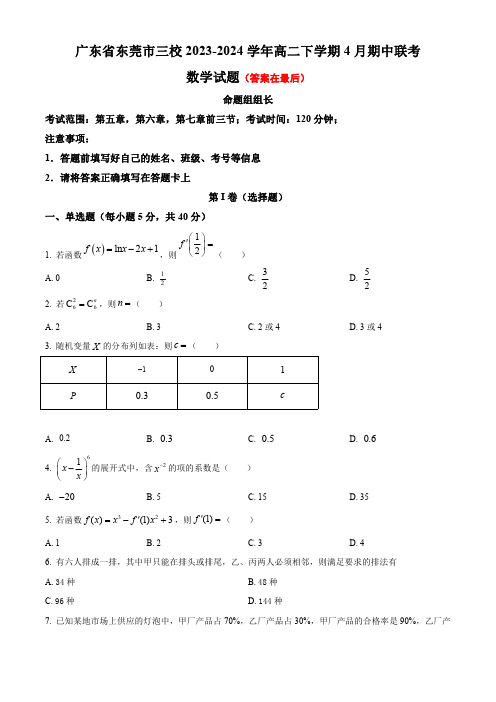
广东省东莞市三校2023-2024学年高二下学期4月期中联考数学试题(答案在最后)命题组组长考试范围:第五章,第六章,第七章前三节;考试时间:120分钟;注意事项:1.答题前填写好自己的姓名、班级、考号等信息2.请将答案正确填写在答题卡上第I 卷(选择题)一、单选题(每小题5分,共40分)1.若函数()ln 21f x x x =-+,则12f ⎛⎫'=⎪⎝⎭()A.0B.12C.32D.522.若266C C n=,则n =()A.2B.3C.2或4D.3或43.随机变量X 的分布列如表:则c =()X1-01P0.30.5cA.0.2B.0.3C.0.5D.0.64.61x x ⎛⎫- ⎪⎝⎭的展开式中,含2x -的项的系数是()A.20- B.5C.15D.355.若函数32()(1)3f x x f x '=-+,则(1)f '=()A.1B.2C.3D.46.有六人排成一排,其中甲只能在排头或排尾,乙、丙两人必须相邻,则满足要求的排法有A.34种 B.48种C.96种D.144种7.已知某地市场上供应的灯泡中,甲厂产品占70%,乙厂产品占30%,甲厂产品的合格率是90%,乙厂产品的合格率是80%,则从该地市场上买到一个合格灯泡的概率是()A.0.63B.0.24C.0.87D.0.218.已知函数()22,02,0ex x x x f x x x ⎧-≤⎪=⎨>⎪⎩,若关于x 的方程()()()210f x f x a a -+-=恰有四个不同的实数根,则实数a 的取值范围是()A.e 21,e +⎡⎫⎪⎢⎣⎭ B.22e 21,e ⎛⎫+ ⎪⎝⎭ C.22e 21,e ⎡⎫+⎪⎢⎣⎭D.e 21,e +⎛⎫⎪⎝⎭二、多选题(每小题6分,共18分.在每小題给出的选项中,有多项符合题目要求.全部选对的得6分,部分选对的得部分分,有选错的得0分)9.下列函数求导正确的是()A.()32223566xx x x'-+=- B.()1eln e xx x x'+=+C.1cos sin 333x x '⎛⎫= ⎪⎝⎭ D.2224241(1)x x x x '⎛⎫+=-- ⎪++⎝⎭10.有3台车床加工同一型号的零件.第1台加工的次品率为6%,第2,3台加工的次品率均为5%,加工出来的零件混放在一起,已知第1,2,3台车床的零件数分别占总数的25%,30%,45%,则下列选项正确的有()A.任取一个零件是第1台生产出来的次品概率为0.015B.任取一个零件是次品的概率为0.0525C.如果取到的零件是次品,则是第2台车床加工的概率为27D.如果取到的零件是次品,则是第3台车床加工的概率为2711.关于函数()2ln f x x x=+,下列判断正确的是()A.2x =是()f x 的极大值点B.函数()y f x x =-有且只有1个零点C.存在正实数k ,使得()f x kx >成立D.对两个不相等的正实数1x ,2x ,若()()12f x f x =,则()121ln 42+>+f x x .第II 卷(非选择题)三、填空题(每小题5分,共15分)12.()5(23)x y x y +-的展开式中33x y 的系数是__________.13.如图所示,在A ,B 间有四个焊接点1,2,3,4,若焊接点脱落导致断路.则电路不通,则因为焊接点脱落而导致电路不通情况有___________种.14.若函数31()3f x x x =-在2(,10)a a -上有最小值,则实数a 的取值范围为______________四、解答题(本题5小题,共77分.解答应写出文字说明,证明过程或演算步骤)15.(1)计算45775354C +C A A -;(2)已知423401234(31)x a a x a x a x a x -=++++,求1234a a a a +++的值.16.某学校的高二年级有5名数学老师,其中男老师3人,女老师2人.(1)如果任选3人参加校级技能大赛,所选3人中女老师人数为X ,求X 的分布列;(2)如果依次抽取2人参加市级技能大赛,求在第1次抽到男老师的条件下,第2次抽到也是男老师的概率.17.已知函数()2ln 3f x ax x b =⋅+(a 、b 为实数)的图象在点()()1,1f 处的切线方程为1y x =+.(1)求实数a 、b 的值;(2)求函数()f x 的单调区间和极值.18.甲乙两家快递公司的“快递小哥”的日工资方案如下:甲公司规定底薪70元,每单奖励1元;乙公司规定底薪100元,每日前45单无奖励,超过45单的部分每单奖励6元.(1)设甲、乙两家快递公司的“快递小哥”日工资分别为1y ,2y (单位:元)与送货单数n (单位:单,n *∈N )的函数关系式分别为1()y f n =,2()y g n =,求1()y f n =,2()y g n =的解析式.(2)假设同一公司的“快递小哥”的日送货单数相同,现从两家公司各随机抽取一名“快递小哥”,并记录其100天的送货单数,得到如下条形图:若将频率视为概率,回答下列问题:①记乙快递公司的“快递小哥”日工资为X 元,求X 的分布列和数学期望;②小赵打算到两家公司中的一家应聘“快递小哥”的工作,如果仅从日工资的角度考虑,请你利用所学的统计知识为他进行选择,并说明理由.19.设函数()()()()101ln 1f x x x x =≠++.(1)求()f x 的单调区间;(2)求()f x 的取值范围;(3)已知不等式112(1)m x x +>+对任意(1,0)x ∈-恒成立,求实数m 的取值范围.广东省东莞市三校2023-2024学年高二下学期4月期中联考数学试题命题组组长:考试范围:第五章,第六章,第七章前三节;考试时间:120分钟;注意事项:1.答题前填写好自己的姓名、班级、考号等信息2.请将答案正确填写在答题卡上第I 卷(选择题)一、单选题(每小题5分,共40分)1.若函数()ln 21f x x x =-+,则12f ⎛⎫'=⎪⎝⎭()A.0 B.12C.32D.52【答案】A 【解析】【分析】求导,再令12x =即可得解.【详解】()12f x x'=-,所以12202f ⎛⎫'=-=⎪⎝⎭.故选:A.2.若266C C n=,则n =()A.2 B.3C.2或4D.3或4【答案】C 【解析】【分析】根据组合数公式的性质求解即可【详解】因为266C C n=,所以2n =或624n =-=,故选:C3.随机变量X 的分布列如表:则c =()X1-01P0.30.5cA.0.2B.0.3C.0.5D.0.6【答案】A 【解析】【分析】由分布列中的概率和为1可直接求得结果.【详解】由分布列性质知:0.30.51c ++=,解得:0.2c =.故选:A.4.61x x ⎛⎫- ⎪⎝⎭的展开式中,含2x -的项的系数是()A.20- B.5C.15D.35【答案】C 【解析】【分析】根据二项式定理求解.【详解】由二项式定理:()6621661C C 1rr r rrr r T xx x --+⎛⎫=-=- ⎪⎝⎭,令622r -=-,得4r =,所以2x -项的系数为()4461C 15-=;故选:C.5.若函数32()(1)3f x x f x '=-+,则(1)f '=()A.1 B.2C.3D.4【答案】A 【解析】【分析】求出函数()f x 的导数,再赋值计算即得.【详解】函数32()(1)3f x x f x '=-+,求导得2()32(1)f x x f x ''=-,当1x =时,()()1321f f =-'',所以(1)1f '=.故选:A6.有六人排成一排,其中甲只能在排头或排尾,乙、丙两人必须相邻,则满足要求的排法有A .34种B.48种C.96种D.144种【答案】C 【解析】【详解】试题分析:4242296A A =,故选C.考点:排列组合.7.已知某地市场上供应的灯泡中,甲厂产品占70%,乙厂产品占30%,甲厂产品的合格率是90%,乙厂产品的合格率是80%,则从该地市场上买到一个合格灯泡的概率是()A.0.63B.0.24C.0.87D.0.21【答案】C 【解析】【分析】根据独立事件和互斥事件概率计算方法计算即可.【详解】从某地市场上购买一个灯泡,设买到的灯泡是甲厂产品为事件A ,买到的灯泡是乙厂产品为事件B ,则由题可知P (A )=0.7,P (B )=0.3,从甲厂产品中购买一个,设买到的产品是合格品为事件C ,从乙厂产品中购买一个,设买到的产品是合格品为事件D ,则由题可知P (C )=0.9,P (D )=0.8,由题可知A 、B 、C 、D 互相独立,故从该地市场上买到一个合格灯泡的概率为:P (AC )+P (BD )=P (A )P (C )+P (B )P (D )=0.7×0.9+0.3×0.8=0.87.故选:C .8.已知函数()22,02,0ex x x x f x x x ⎧-≤⎪=⎨>⎪⎩,若关于x 的方程()()()210f x f x a a -+-=恰有四个不同的实数根,则实数a 的取值范围是()A.e 21,e +⎡⎫⎪⎢⎣⎭ B.22e 21,e ⎛⎫+ ⎪⎝⎭ C.22e 21,e ⎡⎫+⎪⎢⎣⎭D.e 21,e +⎛⎫⎪⎝⎭【答案】D 【解析】【分析】先将原方程变形为()1f x =或()1f x a =-,然后分析()f x 的单调性,再对不同的a 进行分类讨论即可得到结果.【详解】由于()()()()()()()2111f x af x a f x f x a -+-=--+,故原方程等价于()1f x =或()1f x a =-.由于当0x ≤时,()()22211f x x x x =-=--,故()f x 在(],0-∞上单调递减.而当0x >时,有()2e x xf x =,故此时()()21e xx f x ='-,从而当01x <<时()0f x '>,当1x >时()0f x '<,所以()f x 在(]0,1上单调递增,在[)1,+∞上单调递减.从而当0x >时,有()()211ef x f ≤=<,而()f x 在(],0-∞上单调递减,()11f =,所以()1f x =有唯一的解1x =+.若原方程有四个不同的解,则存在四个不同的实数x 满足()1f x =或()1f x a =-,而()1f x =只有一个解,所以方程()1f x a =-至少有三个解.假设10a -≤,则当0x <时()()22201f x x x x x a =-=->≥-,当0x >时()201ex xf x a =>≥-,所以()1f x a =-至多有一个解,矛盾,所以10a ->.假设21ea -≥,则当0x >,1x ≠时有()()211e f x f a <=≤-,从而()1f x a =-在()0,∞+上至多有一个解,由()f x 在(],0-∞上单调递减知()1f x a =-在(],0-∞上至多有一个解,所以()1f x a =-至多有两个解,矛盾,所以21ea -<.综上,有201e a <-<,即211ea <<+;另一方面,当211e a <<+即201e a <-<时,设()91111f u a =+>-,由于(1f a a a =+>>-,()001f a =<-,()211ef a =>-,且()()()()()()222222288888211119181e 21e e 11u u u u u u u f u f f f f a f f u u u a a ⎛⎫ ⎪⎛⎫⎝⎭===⋅=≤=<<- ⎪⎝⎭⎛⎫⎛⎫+ ⎪ ⎪--⎝⎭⎝⎭.故()1f x a =-在(),()0,1,()1,u 上各有一个解,从而至少有三个解.而()11f =,11a ≠-(因为211ea -<<),所以()1f x =或()1f x a =-有四个解.综上,a 的取值范围是21,1e ⎛⎫+ ⎪⎝⎭,即e 21,e +⎛⎫ ⎪⎝⎭,D 正确.故选:D.【点睛】关键点点睛:本题的关键在于恰当选取不同的情况进行分类讨论,对于取值范围问题,需要严格证明命题成立当且仅当参数属于对应范围,而这往往意味着论证需要包含充分性和必要性两方面.二、多选题(每小题6分,共18分.在每小題给出的选项中,有多项符合题目要求.全部选对的得6分,部分选对的得部分分,有选错的得0分)9.下列函数求导正确的是()A.()32223566xx x x'-+=- B.()1eln e xx x x'+=+C.1cos sin 333x x '⎛⎫= ⎪⎝⎭ D.2224241(1)x x x x '⎛⎫+=-- ⎪++⎝⎭【答案】ABD 【解析】【分析】直接根据导数的运算法则及复合函数求导方法计即可判断.【详解】对于A :()32223566x x x x '-+=-,故A 正确;对于B :()1e ln exxxx'+=+,故B 正确;对于C :令3x u =,则cos 3x '⎛⎫ ⎪⎝⎭()1cos sin sin 33x u u u ''==-⋅=-,故C 错误;对于D :241x x '⎛⎫+ ⎪+⎝⎭()2222242411(1)x x x x --⎡⎤=-+-+⨯=--⎣⎦+,故D 正确.故选:ABD .10.有3台车床加工同一型号的零件.第1台加工的次品率为6%,第2,3台加工的次品率均为5%,加工出来的零件混放在一起,已知第1,2,3台车床的零件数分别占总数的25%,30%,45%,则下列选项正确的有()A.任取一个零件是第1台生产出来的次品概率为0.015B.任取一个零件是次品的概率为0.0525C.如果取到的零件是次品,则是第2台车床加工的概率为27D.如果取到的零件是次品,则是第3台车床加工的概率为27【答案】ABC 【解析】【分析】利用乘法公式、互斥事件加法求概率判断A 、B 正误;应用条件概率公式求C 、D 描述中对应的概率,判断正误.【详解】A :由题意任取一个零件是第1台生产出来的次品概率为6%25% 1.5%⨯=,正确;B :由题设,任取一个零件是次品的概率为6%25%5%30%5%45% 5.25%⨯+⨯+⨯=,正确;C :由条件概率,取到的零件是次品,则是第2台车床加工的概率为5%30%26%25%5%30%5%45%7⨯=⨯+⨯+⨯,正确;D :由条件概率,取到的零件是次品,则是第3台车床加工的概率为5%45%36%25%5%30%5%45%7⨯=⨯+⨯+⨯,错误.故选:ABC11.关于函数()2ln f x x x=+,下列判断正确的是()A.2x =是()f x 的极大值点B.函数()y f x x =-有且只有1个零点C.存在正实数k ,使得()f x kx >成立D.对两个不相等的正实数1x ,2x ,若()()12f x f x =,则()121ln 42+>+f x x .【答案】BD 【解析】【分析】①对函数求导,结合函数极值的定义进行判断即可;②求函数的导数,结合函数单调性及零点存在性定理,可判断出零点个数;③利用参数分离法,构造函数()22ln x g x x x=+,求函数的导数,研究函数的单调性和极值进行判断即可;④设1202x x <<<,则142x ->,构造函数并结合函数的单调性,可证明()()1211(4)(4)0f x f x f x f x --=--<,再结合()f x 的单调性,可得到124x x -<,即可得到124x x +>,从而可得证.【详解】A .函数的定义域为()0,∞+,函数的导数()22212x f x x x x-'=-+=,∴在()0,2上,()0f x '<,函数单调递减,()2,∞+上,()0f x ¢>,函数单调递增,∴2x =是()f x 的极小值点,即A 错误;B .()2ln y f x x x x x =-=+-,∴22221210x x y x x x-+-'=-+-=<,函数在()0,∞+上单调递减,且()112ln1110f -=+-=>,()221ln 22ln 210f -=+-=-<,∴函数()y f x x =-有且只有1个零点,即B 正确;C .若()f x kx >,可得22ln x k x x <+,令()22ln +=xg x x x ,则()34ln x x x g x x -+-'=,令()4ln h x x x x =-+-,则()ln h x x '=-,∴在()0,1x ∈上,函数()h x 单调递增,()1,x ∈+∞上函数()h x 单调递减,∴()()10h x h ≤<,∴()0g x '<,∴()22ln x g x x x=+在()0,∞+上函数单调递减,函数无最小值,∴不存在正实数k ,使得()f x kx >恒成立,即C 不正确;D .令()0,2t ∈,则()20,2t -∈,22t +>,令()()()()2222ln 222=+--=++--+-g t f t f t t t t ()242ln 2ln 42+-=+--t tt t t,则()()()()()222222222448222416424244----++--'=+⋅=+=+----t t t t t t g t t t t tt ()222804-<-t t ,∴()g t 在()0,2上单调递减,则()()00g t g <=,令12x t =-,由()()12f x f x =,得22x t >+,则12224x x t t +>-++=,当24x ≥时,124x x +>显然成立,∴对任意两个正实数1x ,2x ,且21x x >,若()()12f x f x =,则124x x +>,所以()()1214ln 42+>=+f x x f .故D 正确.故选:BD.【点睛】本题主要考查命题的真假判断,涉及函数的单调性和极值,函数零点个数的判断,以及构造法证明不等式,对于C ,解题的关键是利用参变分离进行分析,对于D ,解题的关键是判断124x x +>.综合性较强,运算量较大,有一定的难度.第II 卷(非选择题)三、填空题(每小题5分,共15分)12.()5(23)x y x y +-的展开式中33x y 的系数是__________.【答案】360-【解析】【分析】写出5(23)x y -的展开式的通项,然后对r 分类求得答案.【详解】5(23)x y -展开式的通项为()()()555155C 23C 23rrrrrr r r r T x y x y ---+=-=⋅⋅-,0,1,2,,5r = ,①令2r =,则()22332335C 23720y x y x y ⋅⋅-=;②令3r =,则()33223335C 231080x x y x y ⋅⋅-=-;综上可得:展开式中33x y 项的系数为7201080360-=-.故答案为:360-.13.如图所示,在A ,B 间有四个焊接点1,2,3,4,若焊接点脱落导致断路.则电路不通,则因为焊接点脱落而导致电路不通情况有___________种.【答案】13【解析】【分析】分类讨论,列举出脱落1个,2个,3个,4个焊接点导致电路不通的情况,求出答案.【详解】若脱落1个,则有(1),(4)两种情况,若脱落2个,则有(1,2),(1,3),(1,4),(2,3),(2,4),(3,4)共6种情况,若脱落3个,则有(1,2,3),(1,2,4),(2,3,4),(1,3,4)共4种情况.若脱落4个,则有(1,2,3,4)共1种情况,综上共有264113+++=种情况.故答案为:13.14.若函数31()3f x x x =-在2(,10)a a -上有最小值,则实数a 的取值范围为______________【答案】21a -≤<【解析】【详解】f ′(x )=x 2-1=(x +1)(x -1),令f ′(x )>0得x <-1或x >1,令f ′(x )<0得-1<x <1,所以函数f (x )的单调递增区间为(-∞,-1)和(1,+∞),减区间为(-1,1).所以要使函数f (x )=13x 3-x 在(a,10-a 2)上有最小值,只需2110()(1)a a f a f ⎧<<-⎨≥⎩,即231103112233a a a a a a ⎧<<--<<⎧⎪⇒⎨⎨≥--≥-⎩⎪⎩⇒-2≤a <1.四、解答题(本题5小题,共77分.解答应写出文字说明,证明过程或演算步骤)15.(1)计算45775354C +C A A -;(2)已知423401234(31)x a a x a x a x a x -=++++,求1234a a a a +++的值.【答案】(1)712;(2)15【解析】【分析】(1)利用排列数与组合数公式计算即可;(2)利用赋值法求解即可.【详解】(1)45775354C C 35217A A 1202412++==--;(2)令1x =,得()4012343116a a a a a +=+++-=,令0x =,得01a =,所以123415a a a a +++=.16.某学校的高二年级有5名数学老师,其中男老师3人,女老师2人.(1)如果任选3人参加校级技能大赛,所选3人中女老师人数为X ,求X 的分布列;(2)如果依次抽取2人参加市级技能大赛,求在第1次抽到男老师的条件下,第2次抽到也是男老师的概率.【答案】(1)见解析(2)12【解析】【分析】(1)X 的所有可能取值为0,1,2,求出概率得到分布列.(2)利用条件概率转化求解即可.【小问1详解】由题可知X 的所有可能取值为0,1,2,依题意得:3335C 1(0)C 10P X ===,213235C C 3(1)C 5P X ===,123235C C 3(2)C 10P X ===,X ∴的分布列为:X012P11035310【小问2详解】设第1次抽到男老师为事件A ,第2次抽到男老师为事件B ,则第1次和第2次都抽到男老师为事件AB ,根据分步计数原理1134()A A 12n A ==,23()A 6n AB ==.所以()61()()122n AB P B A n A ===.17.已知函数()2ln 3f x ax x b =⋅+(a 、b 为实数)的图象在点()()1,1f 处的切线方程为1y x =+.(1)求实数a 、b 的值;(2)求函数()f x 的单调区间和极值.【答案】(1)1223a b ⎧=⎪⎪⎨⎪=⎪⎩(2)减区间为10,e ⎛⎫ ⎪⎝⎭,增区间为1,e∞⎛⎫+ ⎪⎝⎭,极小值为112e ef ⎛⎫=-+ ⎪⎝⎭,无极大值.【解析】【分析】(1)利用导数的几何意义可得出关于a 、b 的方程组,即可得出实数a 、b 的值;(2)利用导数分析函数()f x 的单调性,结合极值的定义可得结果.【小问1详解】解:因为()2ln 3f x ax x b =⋅+,该函数的定义域为()0,∞+,()()21ln f x a x +'=,因为函数()2ln 3f x ax x b =⋅+(a 、b 为实数)的图象在点()()1,1f 处的切线方程为1y x =+,则()()121132f a f b ⎧==⎪⎨=='⎪⎩,解得1223a b ⎧=⎪⎪⎨⎪=⎪⎩.【小问2详解】解:由(1)可得()ln 2f x x x =+,该函数的定义域为()0,∞+,()1ln f x x ='+,由()0f x '=可得1ex =,列表如下:x10,e ⎛⎫ ⎪⎝⎭1e 1,e ∞⎛⎫+ ⎪⎝⎭()f x '-+()f x 减极小值增所以,函数()f x 的减区间为10,e ⎛⎫ ⎪⎝⎭,增区间为1,e∞⎛⎫+ ⎪⎝⎭,极小值为112e ef ⎛⎫=-+ ⎪⎝⎭,无极大值.18.甲乙两家快递公司的“快递小哥”的日工资方案如下:甲公司规定底薪70元,每单奖励1元;乙公司规定底薪100元,每日前45单无奖励,超过45单的部分每单奖励6元.(1)设甲、乙两家快递公司的“快递小哥”日工资分别为1y ,2y (单位:元)与送货单数n (单位:单,n *∈N )的函数关系式分别为1()y f n =,2()y g n =,求1()y f n =,2()y g n =的解析式.(2)假设同一公司的“快递小哥”的日送货单数相同,现从两家公司各随机抽取一名“快递小哥”,并记录其100天的送货单数,得到如下条形图:若将频率视为概率,回答下列问题:①记乙快递公司的“快递小哥”日工资为X 元,求X 的分布列和数学期望;②小赵打算到两家公司中的一家应聘“快递小哥”的工作,如果仅从日工资的角度考虑,请你利用所学的统计知识为他进行选择,并说明理由.【答案】(1)1 70y n =+,n *∈N ;2100,45,6170,45,n n y n n n **⎧≤∈=⎨->∈⎩N N ;(2)①分布列见解析;期望为112;②推荐小赵去甲快递公司应聘;理由见解析.【解析】【分析】(1)由已知可求得甲快递公司的“快递小哥”的日工资1y 和乙快递公司的“快递小哥”的日工资2 y 与送货单数n 的函数关系式.(2)①由条形图得x 的取值范围为{}100,106,118,130,分别求得(100)P X =,(106)P X =,(118)P X =,(130)P X =,由此可得X 的分布列,根据数学期望公式可得答案.②求得甲快递公司的“快递小哥”日平均工资,由①知,乙快递公司的“快递小哥”日平均工资,比较可得结论.【详解】解:(1)甲快递公司的“快递小哥”的日工资1y 中与送货单数n 的函数关系式为1 ()70y f n n ==+,n *∈N .乙快递公司的“快递小哥”的日工资2 y 与送货单数n 的函数关系式为2100,45,()6170,45,n n y g n n n n **⎧≤∈==⎨->∈⎩N N .(2)①由条形图得x 的取值范围为{}100,106,118,130,1010(100)0.2100P X +===,30(106)0.3100P X ===,40(118)0.4100P X ===,10(130)0.1100P X ===,所以X 的分布列为X100106118130P0.20.30.40.1故X 的数学期望为()1000.21060.31180.41300.1112E X =⨯+⨯+⨯+⨯=.②甲快递公司的“快递小哥”日平均送货单数为420.2440.4460.2480.1500.145⨯+⨯+⨯+⨯+⨯=,所以甲快递公司的“快递小哥”日平均工资为7045=115+(元),由①知,乙快递公司的“快递小哥”日平均工资为112元.故推荐小赵去甲快递公司应聘.19.设函数()()()()101ln 1f x x x x =≠++.(1)求()f x 的单调区间;(2)求()f x 的取值范围;(3)已知不等式112(1)m x x +>+对任意(1,0)x ∈-恒成立,求实数m 的取值范围.【答案】(1)单调递增区间是11,1e ⎛⎫-- ⎪⎝⎭,单调递减区间是()11,0,0,e ⎛⎫-+∞ ⎪⎝⎭;(2)(](),e 0,-∞-⋃+∞;(3)eln 2m >-.【解析】【分析】(1)解决不含参数函数的单调性问题,先求原函数的导函数,接着分析导函数的正负即可得解;(2)由已知函数的单调区间,先分析函数的极值,进而求出它一定属于的范围,再用零点存在定理验证能取遍整个范围即可(3)在不等式两边取自然对数分离参数m ,将证明不等式的恒成立问题转变为求不含参数的函数的最值问题解决即可.【小问1详解】因为函数()()()()101ln 1f x x x x =≠++,则()()()()22ln 111ln 1x f x x x ++=-⎡⎤++⎣⎦'.当()0f x '>时,即()ln 110x ++<,这等价于101e x <+<,解得111ex -<<-;当()0f x '<时,即()ln 110x ++>且0x ≠,这等价于11e x +>且0x ≠,解得110ex -<<或0x >;所以函数()f x 的单调递增区间是11,1e ⎛⎫-- ⎪⎝⎭,函数()f x 的单调递减区间是()11,0,0,e ∞⎛⎫-+ ⎪⎝⎭.【小问2详解】当()0f x '=时,11e x =-,由(1)可知()f x 在11,1e ⎛⎫-- ⎪⎝⎭上递增,在()11,0,0,e ∞⎛⎫-+ ⎪⎝⎭上递减,如图所示:一方面,在区间()1,0-上,根据()f x 在11,1e ⎛⎫-- ⎪⎝⎭上递增,在11,0e ⎛⎫- ⎪⎝⎭上递减,可知()11e e f x f ⎛⎫≤-=- ⎪⎝⎭;而在区间()0,∞+上,显然()()()101ln 1f x x x =>++.故()(](),e 0,f x ∞∞∈--⋃+.另一方面,设()()()1ln 1g x x x =++.对(],e a ∞∈--,有()111100e e g g a ⎛⎫-=-≤<=⎪⎝⎭,所以存在11,0e u ⎡⎫∈-⎪⎢⎣⎭使得()1g u a =,即()f u a =.而对()0,b ∞∈+,有()11111123ln 33ln 3300g g b b b b b b ⎛⎫⎛⎫⎛⎫⎛⎫+=++>+>+>>=⎪ ⎪ ⎪ ⎪⎝⎭⎝⎭⎝⎭⎝⎭,所以存在10,2v b ⎛⎫∈+ ⎪⎝⎭使得()1g v b =,即()f v b =.综上,函数()f x 的取值范围为(](),e 0,∞∞--⋃+.【小问3详解】因为()1,0x ∈-,所以()10,1x +∈,从而111x >+在不等式112(1)m x x +>+两边同时取自然对数可得:()()ln 21ln 1m x x >++对()1,0x ∈-恒成立,即m 大于()()ln 21ln 1x x ++在()1,0x ∈-时的最大值.由(2)可知,此时()()ln 21ln 1x x ++在11ex =-处取得取得最大值eln 2-,所以m 的取值范围是eln 2m >-.【点睛】本题是函数导数综合题,考查借助导数研究函数的单调性、极值(最值)以及证明不等式的恒成立,属于难题.函数导数综合题的考查主要从以下几个角度进行:(1)考查导数的几何意义,往往与解析几何相联系.(2)利用导数求函数的单调区间,判断单调性;已知单调性,求参数.(3)利用导数求函数的最值(极值),解决生活中的优化问题.(4)考查数形结合思想的应用.。
2023-2024学年广东省东莞市万江中学,石龙中学,常平中学三校高二11月期中联考生物试题
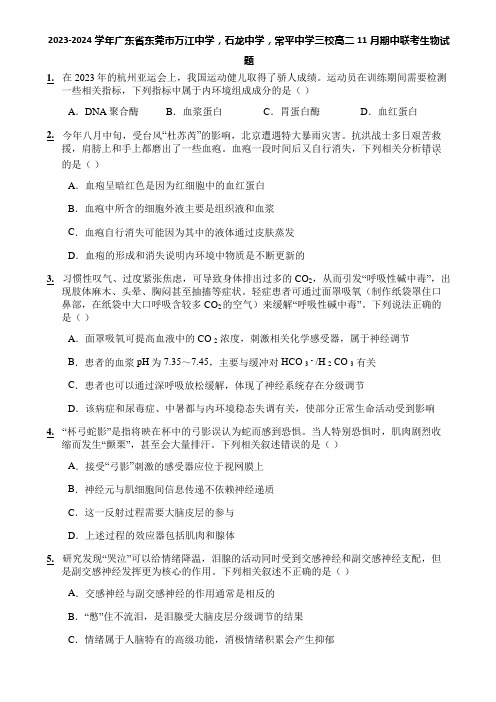
2023-2024学年广东省东莞市万江中学,石龙中学,常平中学三校高二11月期中联考生物试题1.在2023年的杭州亚运会上,我国运动健儿取得了骄人成绩。
运动员在训练期间需要检测一些相关指标,下列指标中属于内环境组成成分的是()A.DNA聚合酶B.血浆蛋白C.胃蛋白酶D.血红蛋白2.今年八月中旬,受台风“杜苏芮”的影响,北京遭遇特大暴雨灾害。
抗洪战士多日艰苦救援,肩膀上和手上都磨出了一些血疱。
血疱一段时间后又自行消失,下列相关分析错误..的是()A.血疱呈暗红色是因为红细胞中的血红蛋白B.血疱中所含的细胞外液主要是组织液和血浆C.血疱自行消失可能因为其中的液体通过皮肤蒸发D.血疱的形成和消失说明内环境中物质是不断更新的3.习惯性叹气、过度紧张焦虑,可导致身体排出过多的CO2,从而引发“呼吸性碱中毒”,出现肢体麻木、头晕、胸闷甚至抽搐等症状。
轻症患者可通过面罩吸氧(制作纸袋罩住口鼻部,在纸袋中大口呼吸含较多CO2的空气)来缓解“呼吸性碱中毒”。
下列说法正确的是()A.面罩吸氧可提高血液中的CO 2浓度,刺激相关化学感受器,属于神经调节B.患者的血浆pH为7.35~7.45,主要与缓冲对HCO 3- /H 2 CO 3有关C.患者也可以通过深呼吸放松缓解,体现了神经系统存在分级调节D.该病症和尿毒症、中暑都与内环境稳态失调有关,使部分正常生命活动受到影响4.“杯弓蛇影”是指将映在杯中的弓影误认为蛇而感到恐惧。
当人特别恐惧时,肌肉剧烈收缩而发生“颤栗”,甚至会大量排汗。
下列相关叙述错误的是()A.接受“弓影”刺激的感受器应位于视网膜上B.神经元与肌细胞间信息传递不依赖神经递质C.这一反射过程需要大脑皮层的参与D.上述过程的效应器包括肌肉和腺体5.研究发现“哭泣”可以给情绪降温,泪腺的活动同时受到交感神经和副交感神经支配,但是副交感神经发挥更为核心的作用。
下列相关叙述不正确的是()A.交感神经与副交感神经的作用通常是相反的B.“憋”住不流泪,是泪腺受大脑皮层分级调节的结果C.情绪属于人脑特有的高级功能,消极情绪积累会产生抑郁D.积极建立和维系良好的人际关系、适量运动都可以帮助我们减少情绪波动6.如图表示神经元及其联系,图2为图1中两个神经元相联系的部位局部放大。
广东省东莞市万江中学2023-2024学年高二上学期10月月考英语试题

广东省东莞市万江中学2023-2024学年高二上学期10月月考英语试题学校:___________姓名:___________班级:___________考号:___________一、阅读理解Best royal palaces in Europe you can visitThere are some royal palaces in Europe that they often open their doors to the public.Drottningholm Palace, SwedenThis breathtaking 17th century palace in Drottningholm is not only the residence of the Swedish royal family, but it’s also a UNESCO World Heritage Site thanks to its impressively preserved castle and theatre. The palace and park are open to the public year-round.Royal Palace of Oslo, NorwayThe official royal residence for the Norwegian royals, this beautiful palace boasts neoclassical architecture and landscaped gardens complete with ponds and eye-catching statues. During the summer months the palace opens to the public on guided tours, which include beautiful staterooms (会客厅), the Bird Room, the Great Hall and the Family Dining Room.Royal Palace of Madrid, SpainWhile the Palacio Real is officially the royal residence, nowadays the Spanish royals choose to live in the Zarzuela Palace instead, with the Madrid palace used mainly for state ceremonies. There are over 3, 000 rooms in this breathtaking palace making it one of the largest palaces in the world. Highlights include the royal kitchens and the painting gallery, while the Changing of the Guard ceremony never fails to be a hit with tourists.Palace of Versailles, FranceIf you seek after a palace that’s luxurious (豪华的), then the Palace of Versailles needs to be on your list. France hasn’t had a royal family since the French Revolution in 1789, but this palace offers a glimpse into how the former royals lived, as well as serving as a museum paying tribute to France’s rich history.1.What is special about Drottningholm Palace?A.It is open to the public.B.It is redecorated.C.It’s the residence of French royal family.D.It’s a UNESCO World Heritage Site. 2.What do the attractions of Royal Palace of Madrid include?A.The painting gallery.B.A history museum.C.Beautiful staterooms.D.An impressive castle.3.What can we learn about Palace of Versailles?A.The changing of the Guard ceremony.B.The process of French Revolution.C.The history of Spanish royals.D.The way of the former royals’ life.Born in Potsdam (in the Kingdom of Prussia) in 1821, Helmholtz was one of the 19th century’s most knowledgeable scientists, whose name turns up in the history of multiple scientific fields and specialties. As a youngster, he had an interest in physics, but that seemed a financially unwise career choice. He went to medical school and studied physiology instead, because he was drawn to others who promoted the point that physiology should be based on the principles of chemistry and physics, not the vital forces that had been popularly emphasized previously.After earning his medical degree, Helmholtz served as an army surgeon before becoming professor of physiology at the University of Konigsberg. During that time, he composed a groundbreaking paper on the conservation of energy, which made him a good reputation in science community. His main argument is that all science can be reduced to mechanics. It is emphasized that Newtonian mechanics and Lagrangian mechanics are mathematically equivalent, so a force can be measured by the Laplace method in terms of the energy transferred by the force or the work done by the force. All of this energy is conserved. While at Konigsberg, he studied the nervous system, optics (光学) and acoustics (声学), especially with regard to the physiology of the senses. Then he moved on to the University of Bonn as professor of anatomy (解剖学) and physiology.After some time at the University of Heidelberg, where he became interested in philosophy, in 1871 he was awarded the physics chair at the University of Berlin. At last he could focus on physics, emphasizing the importance of the principle of least action for explaining physical phenomena. He also explored the branches of Maxwell’s new theory. By this time, he was recognized as one of Germany’s premier scientists, until his death in 1894. 4.Why did Helmholtz choose to study physiology?A.He made the choice for economic difficulty.B.He would like to make himself have more skills.C.He was attracted by a different viewpoint.D.He preferred physiology to chemistry and physics.5.What made Helmholtz popular among scientists?A.His degree in medical science.B.His paper on the conservation of energy.C.His talent in chemistry and physics.D.His achievements as an army surgeon.6.What can be inferred about Helmholtz from the last paragraph?A.He was a famous philosopher.B.He proved Maxwell’s new theory.C.He was a physics professor at Konigsberg.D.He devoted his rest life to physical research.People who frequently eat fruit are more likely to report greater positive mental health and are less likely to report symptoms of depression than those who do not, according to new research from the College of Health and Life Sciences, Aston University. The team also found that people who eat savoury (咸味的) snacks such as crisps (薯片), which are low in nutrients (营养) , are more likely to report greater levels of anxiety.Published in the British Journal of Nutrition, the study surveyed 428 adults from across the UK and looked at the relationship between their consumption of fruit, vegetables, sweet and savoury snacks, and their psychological(心理的) health. The research found that both nutrient-rich fruit and nutrient-poor savoury snacks appeared to be linked to psychological health. They also found that there was no direct association between eating vegetables and psychological health. Based on the survey, the more often people ate fruit, the lower they scored for depression and the higher for mental health, independent of the overall quantity of fruit intake. By contrast, there was no link between these everyday memory lapses (差错) and fruit and vegetables intake or sweet snacks, suggesting a unique relationship between these nutrient-poor savoury snacks, everyday mental lapses, and psychological health.Lead author, PhD student Nicola-Jayne Tuck commented, “Very little is known about how diet may affect mental health, and while we did not directly examine causality here, our findings could suggest that frequently snacking on nutrient-poor savoury foods may increase everyday mental loss, which in tum reduces psychological health.”“It is possible that changing what we snack on could be a really simple way to improveour mental health. It is also possible that the future limit of processed (特殊处理的) snacks at checkouts, could not only improve the country’s physical health, but mental health too.”“Overall, it’s definitely worth trying to get into the habit of reaching for the fruit bowl.”7.Which may lead to greater level of anxiety?A.Savoury snacks.B.Fruit.C.Vegetables.D.Grain. 8.What can we learn from paragraph 2?A.Rich fruit appears not to be linked to psychological healthB.The more fruit people eat, the lower they score for depressionC.There is a relation between the nutrient-poor snacks and mental health.D.There is a direct link between eating vegetables and psychological health9.What does the underlined word “causality” in paragraph 3 refer to?A.The relation between fruit and vegetables.B.The relation between exercise and health.C.The relation between snacks and mental health.D.The relation between diet and mental health.10.Which is the most suitable title for the text?A.Eating habits can prevent diseaseB.Eating unhealthy snacks often is harmful to healthC.Eating vegetables often can improve mental healthD.Eating fruit often may contribute to mental health二、七选五Why do some people enjoy more health and happiness than others? It seems that they are able to realize their dreams rapidly. The good news is that you can be one of those people.Your Happy.Make themselves available to success. Happy people are great goal setters. 12 . This allows them to stand out in different areas of their life. Ask yourself if you are open for opportunities and setting big goals.Don’t use the word luck. When you look at an exceptionally happy person, you may say, “They are so lucky.” But a conversation with them will reveal that luck is not in theirvocabulary. Instead, they believe that passion and persistence equals great results.13 . Exceptionally happy people are busy making their goals come true. They understand that spending time arguing with others takes them away from what they care about most. They love hearing people talk about their views, but happy people won’t spend time trying to convince you to adopt their beliefs.Walk out of their comfort zone and seek risk often. 14 . So they ask for adventure and satisfaction through seeking new experiences. They see risk as growth and are happier because they live a life with no regrets.Realize there is more to life than being happy. Happy people don’t spend a lot of time thinking about happiness. 15 . Happy people still experience setbacks, but they look at those setbacks as a way to learn more about themselves and to grow. Happiness is not something they seek, as it is a daily practice that never leaves them.A.Try to be more patient.B.Don’t try to make you win over with debates.C.They live in the moment and enjoy the ups and downs of life.D.I know this is true from personal experience.E.They work toward their goals daily and see opportunities in everything.F.Happy people have learned that settling in any area of life will hold them back.G.Happiness is available, especially when you understand what happiness is.三、完形填空different reasons.Yang Lin says she was a tea drinker when she was back in China. But she likes coffee and tea 24 now. Drinking coffee for her is a social event. She and her co-workers like to sit in a café and talk over a cup of coffee. Tea, she says, is more about family 25 . She grew up in Fujian province -- an area known for its tea. Ms. Yang says that as a child, her family would 26 together in the evening and talk about the day's events over a steaming pot of tea. So now, 27 the smell of Fujian tea brings back these28 family memories.29 a person in China drinks about five cups of coffee a year. This information comes from the China Coffee Association Beijing. That amount is far below the world average of 240 cups a year. But the association says the amount of coffee that Chinese drink is 30 by about 15 percent every year.16.A.business B.exception C.attitude D.custom 17.A.fundamentally B.severely C.thoroughly D.increasingly 18.A.huge B.ancient C.remote D.initial 19.A.cities B.companies C.shops D.foreigners 20.A.producing B.earning C.operating D.strengthening 21.A.optimistically B.passively C.elegantly D.socially 22.A.famous B.appropriate C.ambitious D.beneficial 23.A.seldom B.only C.often D.never 24.A.completely B.gradually C.equally D.eventually 25.A.memories B.values C.concepts D.traditions 26.A.work B.gather C.cook D.participate 27.A.even B.still C.somewhat D.hardly 28.A.rare B.tough C.brilliant D.warm 29.A.Above all B.In summary C.On average D.On the whole 30.A.decreasing B.growing C.casting D.engaging四、用单词的适当形式完成句子(所给词的适当形式填空)32.Some experts recommend that parents shouldn’t make their children (expose) to too much violence in any form.(所给词的适当形式填空)33.Motivated by the inspiring presentation, the student made up his mind to beambitious astronomer.(用适当的词填空)34.depressed the scientist was that his theory was proved wrong.(用适当的词填空)35.There is no (deny) that the driver was to blame for the accident.(所给词的适当形式填空)36.It was the first time that the baby (come) down with the flu, causing severe symptoms.(所给词的适当形式填空)37.Students should be encouraged to develop good habits and better behave (they). (所给词的适当形式填空)38.The debate between them was it was worthwhile to afford the extra expense of hiring an expensive apartment.(用适当的词填空)39.All the countries in the zone (sincere) appreciated the Belt and Road Initiative that Chairman Xi had put forward.(所给词的适当形式填空)40.The number of people who subscribed the magazine saw a substantial decrease because of the decline of economy.(用适当的词填空)五、句型转换41.The delicious cuisine is made up of many exceptional ingredients, including some rare六、汉译英(整句)47.一般来说,乐观的人更可能会快速地适应新的环境。
广东省东莞市常平中学等三校2023-2024学年高二下学期期中联考数学试题(原卷版)
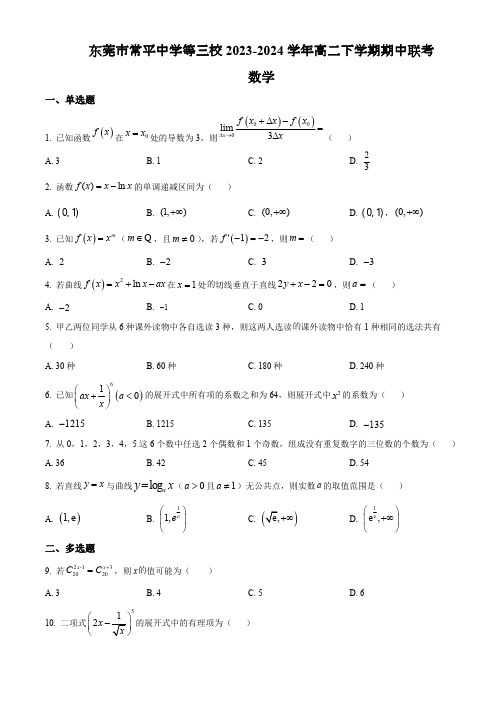
东莞市常平中学等三校2023-2024学年高二下学期期中联考数学一、单选题1. 已知函数在处的导数为3,则( )A. 3B. 1C. 2D. 2. 函数的单调递减区间为( )A. B. C. D. ,3. 已知(,且),若,则( )A. B. C. D. 4. 若曲线在处切线垂直于直线,则( )A. B. C. 0 D. 15. 甲乙两位同学从6种课外读物中各自选读3种,则这两人选读课外读物中恰有1种相同的选法共有( )A. 30种B. 60种C. 180种D. 240种6. 已知的展开式中所有项的系数之和为64,则展开式中的系数为( )A. B. 1215 C. 135 D. 7. 从0,1,2,3,4,5这6个数中任选2个偶数和1个奇数,组成没有重复数字的三位数的个数为()A. 36B. 42C. 45D. 548. 若直线与曲线(且)无公共点,则实数的取值范围是( )A. B. C. D. 二、多选题9. 若,则x 值可能为( )A. 3B. 4C. 5D. 610. 二项式的展开式中的有理项为( )的的的()f x 0x x =()()000lim 3x f x x f x x ∆→+∆-=∆23()ln f x x x =-(0,1)(1,)+∞(0,)+∞(0,1)(0,)+∞()m f x x =Q m ∈0m ≠()12f '-=-m =22-33-()2ln f x x x ax =+-1x =220y x +-==a 2-1-()610ax a x ⎛⎫+< ⎪⎝⎭2x 1215-135-y x =log a y x =0a >1a ≠a ()1,e 11,e e ⎛⎫ ⎪⎝⎭)+∞1e e ,⎛⎫+∞ ⎪⎝⎭2-132020x x C C +=52x ⎛ ⎝A. B. C. D. 11. 下列有关导数运算和几何意义的说法,正确的是( )A. 若,则B. 若,则C. 在处的切线斜率是D. 过点的切线方程是三、填空题12. 已知的展开式的第7项为常数项,则正整数的值为_________.13. 某同学有4本相同的小说书,1本散文书.从中取出4本书送给4个朋友,每人1本,则不同的赠法有______种14. 若函数在上不单调,则实数的取值范围为____________.四、解答题15. 求下列函数的导函数.(1)(2)(3)(4)(5)(6)16 已知函数.(1)求函数的单调区间;(2)求在上的值域.17. 设,,(1)当时,若的.10x 80x 280x 532x ()ln3f x =()13f x '=()tan =f x x ()21tan f x x=+'()2xf x =1x =ln4()31f x x =+()2,512190x y --=312nx x ⎛⎫+ ⎪⎝⎭n ()22ln 1f x x a x =-+()3,a a -a ()3224f x x x =-+()32113f x x x ax =-++()cos ,(0,1)f x x x x =+∈2()3ln f x x x x=-+-sin y x =11x y x +=-()()2e x f x x =-()f x ()f x []1,2-,m n N ∈()(1)(1)m n f x x x =+++7m n ==76543276543210()f x a x a x a x a x a x a x a x a =+++++++求.(2)当时,若展开式中的系数是20,求的值.(3)展开式中的系数是19,当,变化时,求系数的最小值.18. 已知函数与函数.(1)若的图象在点处有公共的切线,求实数a 的值;(2)设,求函数的极值.19. 已知函数.(1)若是函数的一个极值点,求实数的值;(2)若函数有两个极值点,其中,①求实数的取值范围;②若不等式恒成立,求实数的取值范围.0246a a a a +++m n =()f x 2x n ()f x x m n 2x 2()1f x x =-()ln (0)g x a x a =≠(),()f x g x (1,0)()()2()F x f x g x =-()F x ()()2ln 3f x x x ax x a =--∈R 1x =()f x a ()f x 12,x x 12x x <a 122ln 31ax k x k +>+k。
2023-2024学年广东省东莞市常平中学等三校联考高一(上)期中数学试卷【答案版】
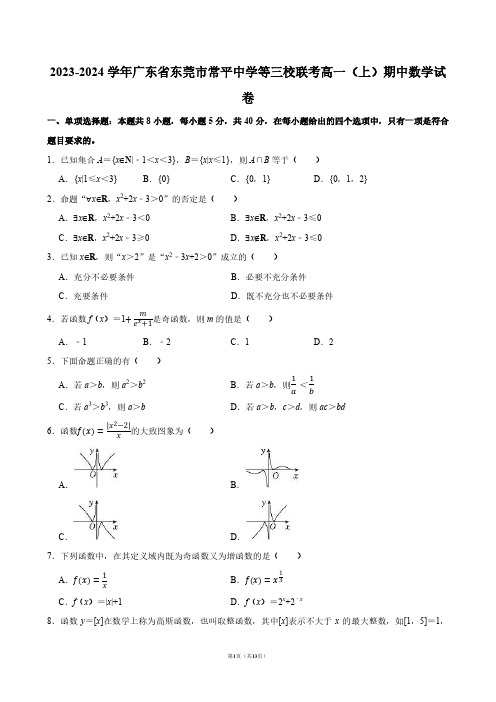
2023-2024学年广东省东莞市常平中学等三校联考高一(上)期中数学试卷一、单项选择题:本题共8小题,每小题5分,共40分,在每小题给出的四个选项中,只有一项是符合题目要求的。
1.已知集合A ={x ∈N |﹣1<x <3},B ={x |x ≤1},则A ∩B 等于( ) A .{x |1≤x <3}B .{0}C .{0,1}D .{0,1,2}2.命题“∀x ∈R ,x 2+2x ﹣3>0”的否定是( ) A .∃x ∈R ,x 2+2x ﹣3<0 B .∃x ∈R ,x 2+2x ﹣3≤0 C .∃x ∈R ,x 2+2x ﹣3≥0D .∃x ∉R ,x 2+2x ﹣3≤03.已知x ∈R ,则“x >2”是“x 2﹣3x +2>0”成立的( ) A .充分不必要条件 B .必要不充分条件 C .充要条件D .既不充分也不必要条件4.若函数f (x )=1+me x +1是奇函数,则m 的值是( ) A .﹣1B .﹣2C .1D .25.下面命题正确的有( ) A .若a >b ,则a 2>b 2 B .若a >b ,则1a<1bC .若a 3>b 3,则a >bD .若a >b ,c >d ,则ac >bd6.函数f(x)=|x 2−2|x 的大致图象为( )A .B .C .D .7.下列函数中,在其定义域内既为奇函数又为增函数的是( ) A .f(x)=1x B .f(x)=x 13 C .f (x )=|x |+1D .f (x )=2x +2﹣x8.函数y =[x ]在数学上称为高斯函数,也叫取整函数,其中[x ]表示不大于x 的最大整数,如[1,5]=1,[﹣2,3]=﹣3,[3]=3.那么不等式4[x ]2﹣12[x ]+5≤0成立的必要不充分条件是( ) A .[12,52]B .[1,2]C .[1,3)D .[1,3]二、多项选择题:本题共4小题,每小题5分,共20分,在每小题给出的选项中,有多项符含题目要求。
广东省东莞市三校2023-2024学年高二下学期4月期中联考物理试题(含答案)
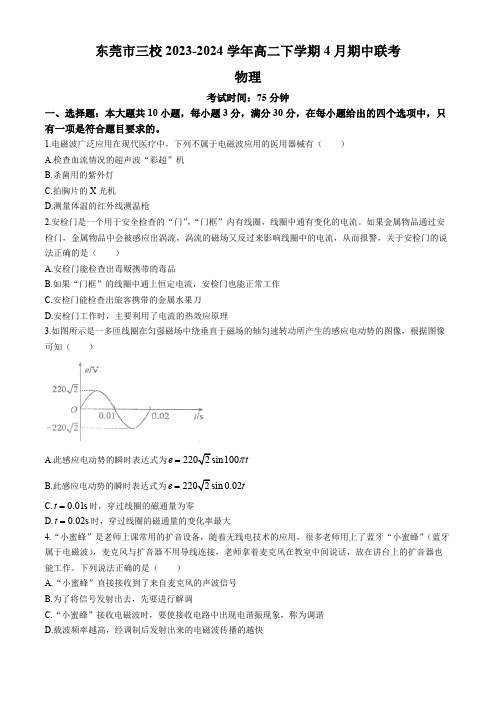
东莞市三校2023-2024学年高二下学期4月期中联考物理考试时间:75分钟一、选择题:本大题共10小题,每小题3分,满分30分,在每小题给出的四个选项中,只有一项是符合题目要求的。
1.电磁波广泛应用在现代医疗中,下列不属于电磁波应用的医用器械有( )A.检查血流情况的超声波“彩超”机B.杀菌用的紫外灯C.拍胸片的X 光机D.测量体温的红外线测温枪2.安检门是一个用于安全检查的“门”,“门框”内有线圈,线圈中通有变化的电流。
如果金属物品通过安检门,金属物品中会被感应出涡流,涡流的磁场又反过来影响线圈中的电流,从而报警,关于安检门的说法正确的是()A.安检门能检查出毒贩携带的毒品B.如果“门框”的线圈中通上恒定电流,安检门也能正常工作C.安检门能检查出旅客携带的金属水果刀D.安检门工作时,主要利用了电流的热效应原理3.如图所示是一多匝线圈在匀强磁场中绕垂直于磁场的轴匀速转动所产生的感应电动势的图像,根据图像可知()A.此感应电动势的瞬时表达式为B.此感应电动势的瞬时表达式为C.时,穿过线圈的磁通量为零D.时,穿过线圈的磁通量的变化率最大4.“小蜜蜂”是老师上课常用的扩音设备,随着无线电技术的应用,很多老师用上了蓝牙“小蜜蜂”(蓝牙属于电磁波),麦克风与扩音器不用导线连接,老师拿着麦克风在教室中间说话,放在讲台上的扩音器也能工作。
下列说法正确的是()A.“小蜜蜂”直接接收到了来自麦克风的声波信号B.为了将信号发射出去,先要进行解调C.“小蜜蜂”接收电磁波时,要使接收电路中出现电谐振现象,称为调谐D.载波频率越高,经调制后发射出来的电磁波传播的越快e t π=0.02e t =0.01s t =0.02s t =5.通电导线在匀强磁场受到安培力F 方向,正确的是( )A. B. C. D.6.如图所示,金属棒与金属导轨垂直放置,且接触良好,导轨间有垂直纸面向里的匀强磁场,当金属棒ab 沿导轨向右匀速滑动时,螺线管左侧小磁针的N 极受力方向为()A.水平向左B.水平向右C.垂直纸面向里D.垂直纸面向外7.在某个趣味物理小实验中,几位同学手拉手与一节电动势为1.5V 的干电池、导线、电键、一个有铁芯的多匝线圈按如图所示方式连接,实验过程中人会有触电的感觉.设开关闭合稳定后线圈中的电流为,下列说法正确的是()A.断开开关时线圈中的电流突然增大B.断开开关时流过人体的电流为C.人有触电感觉时流过人体的电流方向为A →BD.人有触电感觉时流过人体的电流大于流过线圈的电流8.先后用不同的交流电源给同一盏灯泡供电。
广东省东莞市东莞中学2023-2024学年高二上学期第一次段考数学试题
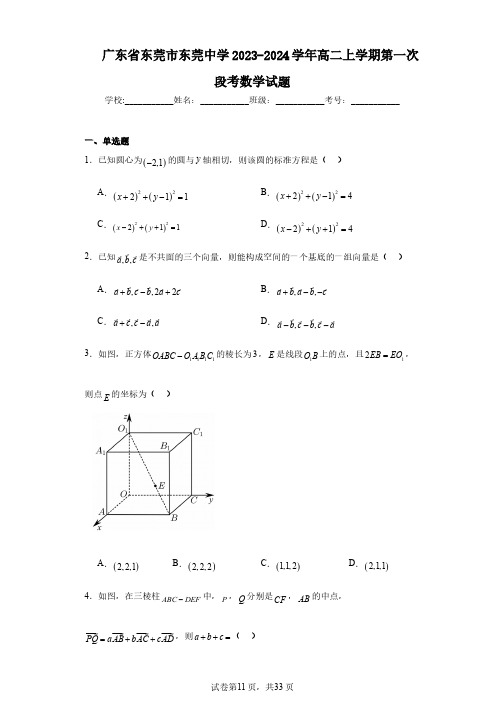
广东省东莞市东莞中学2023-2024学年高二上学期第一次段考数学试题学校:___________姓名:___________班级:___________考号:___________一、单选题1.已知圆心为()2,1-的圆与y 轴相切,则该圆的标准方程是( )A .()()22211x y ++-=B .()()22214x y ++-=C .()()22211x y -++=D .()()22214x y -++=2.已知,,a b cr r r 是不共面的三个向量,则能构成空间的一个基底的一组向量是( )A .,,22a b c b a c +-+r r r r r r B .,,a b a b c +--r r r r r C .,,a c c a a+-r r r r r D .,,a b c b c a---r r r r r r 3.如图,正方体1111OABC O A B C -的棱长为3,E 是线段1O B 上的点,且12EB EO =,则点E 的坐标为( )A .()2,2,1B .()2,2,2C .()1,1,2D .()2,1,14.如图,在三棱柱ABC DEF -中,P ,Q 分别是CF ,AB 的中点,PQ aAB bAC cAD =++uuu r uuu r uuu r uuu r,则a b c ++=( )由11//B C AD 知11,AD C B 共面,显然1EC 在这个平面内,1EC 与AD 共面,C 错;连接11B D ,11A C ,11A C 与11B D 的交点为F ,则EF ^平面1ACD ,连接1BC ,1B C ,正方体中,,E F 分别是111,A B A C 中点,则1//EF BC ,由CD ^平面11BCC B ,1B C Ì平面11BCC B ,则1BC CD ^,又11BC B C ^,1B C 与CD 是平面11B CDA 内两相交直线,∴1BC ^平面11B CDA ,∴EF ^平面11B CDA ,即EF ^平面1ACD ,B 正确;设1B C 交1BC 于点M ,连接1A M ,则1BA M Ð是直线1BA 与平面1ACD 所成角,=。
广东省东莞第一中学、实验中学等三校2023-2024学年高二下学期期中联考数学试卷
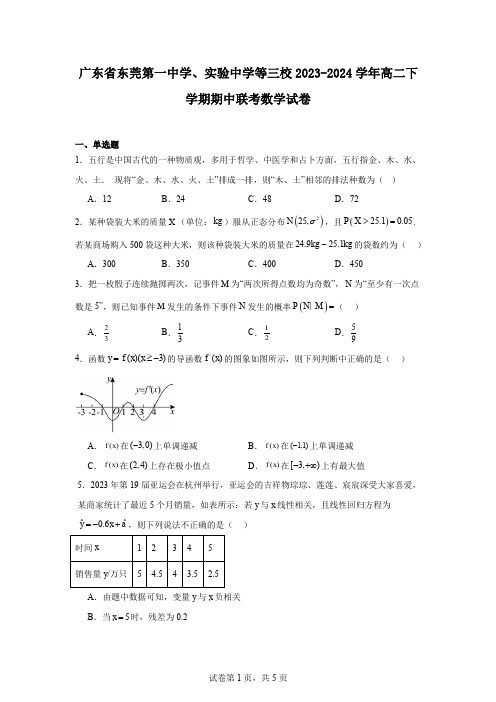
广东省东莞第一中学、实验中学等三校2023-2024学年高二下学期期中联考数学试卷一、单选题1.五行是中国古代的一种物质观,多用于哲学、中医学和占卜方面,五行指金、木、水、火、土. 现将“金、木、水、火、土”排成一排,则“木、土”相邻的排法种数为( ) A .12B .24C .48D .722.某种袋装大米的质量X (单位:kg )服从正态分布()225,N σ,且()25.10.05P X >=.若某商场购入500袋这种大米,则该种袋装大米的质量在24.9kg 25.1kg ~的袋数约为( ) A .300B .350C .400D .4503.把一枚骰子连续抛掷两次,记事件M 为“两次所得点数均为奇数”,N 为“至少有一次点数是5”,则已知事件M 发生的条件下事件N 发生的概率()P NM =∣( ) A .23B .13C .12D .594.函数()(3)y f x x =≥-的导函数()f x '的图象如图所示,则下列判断中正确的是( )A .()f x 在(3,0)-上单调递减B .()f x 在(1,1)-上单调递减C .()f x 在(2,4)上存在极小值点D .()f x 在[3,)-+∞上有最大值5.2023年第19届亚运会在杭州举行,亚运会的吉祥物琮琮、莲莲、宸宸深受大家喜爱,某商家统计了最近5个月销量,如表所示:若y 与x 线性相关,且线性回归方程为0.6ˆˆ=-+yx a ,则下列说法不正确的是( )A .由题中数据可知,变量y 与x 负相关B .当5x =时,残差为0.2C .可以预测当6x =时销量约为2.1万只D .线性回归方程0.6ˆˆ=-+yx a 中ˆ 5.7a = 6.为了解喜爱足球是否与性别有关,随机抽取了若干人进行调查,抽取女性人数是男性的2倍,男性喜爱足球的人数占男性人数的56,女性喜爱足球的人数占女性人数的13,若本次调查得出“在犯错误的概率不超过0.005的前提下认为喜爱足球与性别有关”的结论,则被调查的男性至少有( )人 ()()()()22()n ad bc a b c d a c b d χ-=++++A .11B .12C .13D .147.若对任意的 ()12,,x x m ∈+∞且 12211221ln ln 2x x x x x x x x -<<-,,则实数m 的取值范围是( ) A .()0,1B .1,e e ⎡⎤⎢⎥⎣⎦C .1,e ∞⎡⎫+⎪⎢⎣⎭D .1,e ∞⎛⎫+ ⎪⎝⎭8.已知随机变量的分布列为(下表):则下列说法正确的是( ) A .存在(),0,1x y ∈,()1E ξ> B .对任意(),0,1x y ∈,()14E ξ≤C .存在(),0,1x y ∈,()14D ξ>D .对任意(),0,1x y ∈,()()DE ξξ≤二、多选题9.关于 52x x ⎛⎫+ ⎪⎝⎭的展开式,下列结论正确的是( )A .所有的二项式系数和为16B .所有项的系数和为243C .只有第3项的二项式系数最大D .x 的系数为4010.过点(),P a b 作直线l 与函数()32f x x =-的图象相切,则( )A .若P 与原点重合,则l 方程为0y =B .若l 与直线60x y -=垂直,则64a b +=C .若点P 在()f x 的图象上,则符合条件的l 只有1条D .若符合条件的l 有3条,则312a b <-11.学校食堂每天中午都会提供A ,B 两种套餐供学生选择(学生只能选择其中的一种),经过统计分析发现:学生第一天选择A 套餐的概率为23,选择B 套餐的概率为13.而前一天选择了A 套餐的学生第二天选择A 套餐的概率为14,选择B 套餐的概率为34;前一天选择B套餐的学生第二天选择A 套餐的概率为12,选择B 套餐的概率也是12,如此反复.记某同学第n 天选择A 套餐的概率为n A ,选择B 套餐的概率为n B .一个月(30天)后,记甲、乙、丙三位同学选择B 套餐的人数为X ,则下列说法中正确的是( )A .1n n AB += B .数列25n A ⎧⎫-⎨⎬⎩⎭是等比数列C .() 1.5E X =D .()361125P X ==三、填空题12.口袋里有大小相同的2个红球和3个黄球,现从中任取两个球,则取出的两个球都是红球的概率是13.为了推动农业高质量发展,实施一二三五计划,枣阳市政府将枣阳市划分成①湖垱生态农业区,②桐柏山生态农业区,③数字农业区,④生态走廊区和⑤大洪山生态农业区五个发展板块(如下图),现用四种颜色给各个板块着色,要求有公共边界的两个板块不能用同一种颜色,则不同的着色方法有种.14.随着城市经济的发展,早高峰问题越发严重,上班族需要选择合理的出行方式.某公司员工小明上班出行方式有自驾、坐公交车、骑共享单车三种,某天早上他选择自驾、坐公交车、骑共享单车的概率分别为111,,333,而他自驾、坐公交车、骑共享单车迟到的概率分别为111,,456,则小明这一天迟到的概率为;若小明这一天迟到了,则他这天是自驾上班的概率为.四、解答题15.一个不透明的袋子中,放有大小相同的5个球,其中3个黑球,2个白球,不放回的依次取出2个球,求:(1)求第1次抽到黑球且第2次也抽到黑球的概率; (2)已知第1次抽到黑球,则第2次抽到黑球的概率;(3)判断事件“第1次抽到黑球”与“第2次抽到黑球”是否互相独立.16.已知函数()()21e =--+x f x x ax b ,曲线()y f x =在点()()1,1f 处的切线方程为()e 23e y x =-+-.(1)求实数a ,b 的值; (2)求()f x 的单调区间和极值.17.某地脐橙,因“果皮中厚、脆而易剥,肉质细嫩化渣、无核少络,酸甜适度,汁多爽口,余味清香”而闻名.为了防止返贫,巩固脱贫攻坚成果,各职能部门对脐橙种植、销售、运输、改良等各方面给予大力支持.已知脐橙分类标准:果径80mm 85mm :为一级果,果径75mm :80mm 为二级果,果径7075mm :或85mm 以上为三级果.某农产品研究所从种植园采摘的大量该地脐橙中随机抽取1000个,测量这些脐橙的果径(单位:mm ),得到如图所示的频率分布直方图.(1)试估计这1000个脐橙的果径的中位数;(2)在这1000个脐橙中,按分层抽样的方法在果径7085mm :中抽出9个脐橙,为进一步测量其他指标,在抽取的9个脐橙中再抽出3个,求抽到的一级果个数X 的分布列和数学期望;(3)以样本估计总体,用频率代替概率,某顾客从种植园的这批脐橙中随机购买100个,其中一级果的个数为Y ,记一级果的个数为k 的概率为()P Y k =,写出()P Y k =的表达式,并求出当k 为何值时,()P Y k =最大?18.已知函数()2ln 2,R f x x x ax a =+-∈,(1)当0a >时,讨论()f x 的单调性;(2)若函数()f x 有两个极值点()1212,x x x x <,求()()122f x f x -的最小值.。
广东省东莞市常平中学2024-2025学年高二上学期11月期中生物试题(含答案)

2024-2025学年第一学期期中考试高二生物说明:本试卷分为第Ⅰ卷和第Ⅱ卷两部分。
第Ⅰ卷为选择题,共40分;第Ⅱ卷为非选择题,共60分;全卷满分100分。
考试时间为75分钟。
第Ⅰ卷(选择题,共40分)一、选择题:(本题共16小题,1-12每小题2分,共24分,13-16每小题4分,共16分。
每小题只有一个选项最符合题意。
)1.下列重要化学反应可发生在内环境中的是( )A.淀粉在消化道内的水解 B.葡萄糖的氧化分解C.乙酰胆碱被乙酰胆碱酯酶降解 D.胰岛素的合成和加工2.神经调节、体液调节、免疫调节的实现都离不开信号分子。
关于信号分子的叙述错误的是()A.信号分子的作用方式都是直接与受体接触B.不同信号分子受体结构各异但都位于细胞膜上C.干扰素、性激素、白细胞介素等均属于信号分子D.信号分子在血浆、组织液、淋巴液中均有分布3.脑卒中是由脑部血管突然破裂或血管阻塞导致血液不能流入大脑而引起的脑组织损伤的一种疾病。
研究表明,若脑卒中患者出现血浆渗透压升高和代谢性酸中毒的症状,则其死亡率会明显升高。
下列表述错误的是( )A.内环境稳态是指内环境中组成成分和理化性质处于相对稳定状态B.静脉注射碳酸氢钠溶液可能会降低脑卒中患者的死亡率C.血液中氧含量不足可能是引起酸中毒的重要原因D.患者出现血浆渗透压升高引起组织水肿4.如图表示人体内的细胞与外界环境之间进行物质交换的过程。
A、B、C、D表示直接与内环境进行物质交换的四种主要器官,①②是有关的生理过程。
据图分析不正确的是()A.内环境与A交换气体需要通过的结构是肺泡壁、毛细血管壁B.B内的营养物质通过①过程进入内环境,①表示的过程是食物的消化和营养物质的吸收C.②过程表示肾小管和集合管的重吸收作用D.A、B、C、D四种器官依次为肺、胃、肾脏、皮肤5.生理学研究史中,狗、鸡都是良好的实验材料。
下列相关叙述错误的是( )A.给狗喂食,狗会分泌唾液,此时食物是条件刺激;给狗听铃声而不给食物,狗不会分泌唾液,此时铃声是无关刺激B.班廷和贝斯特结扎狗的胰管,使胰腺萎缩,萎缩的胰腺提取液可以用来治疗狗的糖尿病C.科学家手术摘除成年狗的甲状腺,成年狗会出现行动呆笨迟缓、精神萎靡等症状,说明甲状腺与神经系统的兴奋性有关D.公鸡睾丸的摘除和重新移植实验证明睾丸影响公鸡的雄性特征6.设置对照是生物实验中常用的方法,下列有关对照实验设置错误的是()A.验证金丝雀虉草胚芽鞘的感光部位在尖端时,设置保留尖端和去除尖端的两组B.探索扦插枝条生根的NAA最适浓度的预实验中,需要用蒸馏水处理作对照组C.验证甲状腺激素具有促进新陈代谢的作用,对照组注射等量不含甲状腺激素的生理盐水溶液D.探究酵母菌细胞的呼吸方式实验中,有氧条件和无氧条件均为实验组7.研究发现“哭泣”可以给情绪降温,泪腺的活动同时受到交感神经和副交感神经支配,但是副交感神经发挥更为核心的作用。
- 1、下载文档前请自行甄别文档内容的完整性,平台不提供额外的编辑、内容补充、找答案等附加服务。
- 2、"仅部分预览"的文档,不可在线预览部分如存在完整性等问题,可反馈申请退款(可完整预览的文档不适用该条件!)。
- 3、如文档侵犯您的权益,请联系客服反馈,我们会尽快为您处理(人工客服工作时间:9:00-18:30)。
广东省东莞市万江中学,石龙中学,常平中学三校联考2023-2024学年高二上学期11月期中英语试题学校:___________姓名:___________班级:___________考号:___________一、阅读理解Kemira Boyd had just jumped in the shower when she heard her stepmother, Tammy Boyd, knocking on the door. Kemira’s 12-day-old daughter Ryleigh was choking. Kemira tried everything, but she still couldn’t breathe. Kemira knew Ryleigh needed to get to the hospital fast.They had barely driven out of their neighborhood when a police car appeared behind them. Deputy Will Kimbro figured that the speeding driver was either too distracted to notice him or unconcerned. Kimbro soon found out it was a frightening combination of the two.Once she’d pulled over, Kemira handed the baby to Kimbro. He put a hand on her little chest. Ryleigh’s heart was barely beating. Kimbro radioed for an ambulance. At that time Ryleigh’s lips were already blue.The fact that Kimbro was there was a miracle. He had recently completed a CPR class and knew how to treat a child.“Although I was shocked, my training kicked in, and I went to work to keep that child alive,” said Kimbro. Then he began tapping Ryleigh’s chest, hoping to press her heart back into action. Thanks to the CPR class, Kimbro knew the choking child didn’t have a chance if there was a blockage, and he used one finger to clear her airway. That was a magic touch. Twenty seconds later, Ryleigh began to cry. “If she’s crying like that, she’s breathing,” said Kimbro.But they still had five more minutes until the ambulance would arrive, and Kimbro worried that Ryleigh would choke again. He continued with delicate chest compression and clearing her airway.After transferring Ryleigh to the ambulance, Kimbro drove away. At the hospital, Ryleigh recovered quickly thanks to a determined police officer who was in the right place at the right time.1.Why did Kemira stop her car outside her neighborhood?A.She wanted to ask for help.B.She had broken traffic rules.C.She needed to care for the child.D.She planned to talk with Kimbro.2.What was Kimbro like when he dealt with the emergency?A.Nervous.B.Frightened.C.Calm.D.Shocked 3.What may be the best title for the text?A.An encounter saved a life B.A CPR class is importantC.A clever and brave policeman D.A mother’s experienceMusa Haidar holds a coconut (椰子) to his ear and shakes it from side to side. Its sound pleases the market trader, who puts the large brown fruit back on the pile at his market stand in the suburb of Zanzibar, a city on the East African Island.His customers are less happy, however. A coconut going for 500 shillings a few years ago today sells for 1,500 shillings. That makes it more expensive to cook curries or other dishes using coconut milk. “The prices are not normal,” says Mr. Haidar. “Coconuts have become expensive for local people.”Why have prices gone nuts? “People are chopping (砍), chopping,” he explains. A count in 2014 found just 3.4 million coconut trees, down from 5.7 million in the late 1990s. Since hungry Zanzibaris still demand creamy fish curries and beans baked in coconut milk, falling supply has led to higher prices. Coconuts from the mainland are pricier because of high transport costs.The logging of coconut trees reflects the urbanization wave in Zanzibar and the rest of Africa where urban sprawl is the most striking feature, cities extending outwards rather than growing upwards. Because of that, when people move to a new land, they chop down the coconut trees to make space for their new homes.Moreover, some houses and island hotels have furniture made from coconut wood. Emmanuel Elias, a woodworker, explains that it is cheaper than the imported one. By law farmers cannot chop down fruit-bearing trees for furniture; in practice it is hard to stop them. Even if they obey the rules, many do not plant new trees, since these take at least six years to produce fruits, and fifteen years to reach maximum production levels. State subsidies (补贴) for seeds have proved no match for urban population growth.In his workshop, Mr. Elias dusts off a solid dressing table he is selling for 400,000 shillings. He points out that it is made of coconut wood. “This is the land of coconut trees,”he says. But for how much longer?4.What does the underlined word “sprawl” in paragraph 4 mean?A.Structure.B.Capacity.C.Expansion.D.Management. 5.Why are farmers in Zanzibar unwilling to plant coconut trees?A.They can’t get the state subsides.B.They can’t afford to wait for fruits.C.They are following the existing regulations.D.They have switched to the furniture industry.6.What can we infer about the author’s opinion on coconut trees from the text?A.He worries about their future.B.He expects their faster growth.C.He takes pride in their number.D.He doubts their value for furnitureIn the late 1990s, a scientist named Mark Blumberg stood in a lab at the University of Iowa watching a few sleeping newlyborn rats. He found that the baby rats kept making small, sharp movements in their sleep, and that their closed eyes moved from side to side in a phenomenon known as rapid eye movement (REM). Blumberg knew that the rats were fine, because he knew people do the same during REM sleep. And scientists have long had an explanation for the twitches (抽动) and REM: They are dreaming about their waking life.However, as he dug deeper, he wondered why adult rats spend only about two hours of each night in REM sleep, while baby rats spend an unusual amount of time in REM, often sleeping for sixteen hours a day and dreaming for eight.“If dreams are hints of waking life, adult rats who have more experiences should spend more time in REM sleep. Why do baby rats, whose eyes are still shut, spend so much time in REM sleep when they have too little to dream about?” he wondered. “Why do their eyes, their legs, tails and whiskers move hundreds of thousands of times during their sleep?”In the end, Blumberg concluded that it might be the other way around — perhaps the movements were sending signals to the brain to help it learn about the body.“You wouldn’t think that the body is something a brain needs to learn,” he wrote in a paper. “But we aren’t born with maps of our bodies. We can’t be, because our bodies change by the day. But in waking life, we cannot move only a single muscle. Even the simplest act ofswallowing (吞咽) employs more than thirty pairs of nerves and muscles working together. Our small and sharp movements in sleep, by contrast, are exact and precise: They involve muscles one at a time. In other words, such movements allow the muscles and nerves to form one-to-one connections that otherwise would be impossible. It’s a process that’s most important for the brain to learn about the body as we grow, suffer injuries and learn new skills.7.What was the previous explanation for REM?A.It was just an outward sign of dreams.B.It showed the difficulty in sleeping.C.It was an indicator of terrible dreams.D.It only occured to sleeping baby rats.8.What can be learned from paragraph 2?A.Baby rats have to spend all night in REM sleep.B.REM sleep just accounts for part of the sleeping time.C.It is unnecessary for baby rats to sleep 16 hours a day.D.It is not enough for adults to have two hours of REM sleep.9.What is a feature of the movements in REM sleep according to Mark Blumberg?A.They teach the brain new skills and heal injuries.B.Muscles have to work together to start the movements.C.Each of them just involves a muscle and a nerve at a time.D.They are less exact and precise than our daily movements.10.What is the text mainly about?A.The importance of REM sleep.B.The latest discoveries about dreaming.C.The relationship between dreams and waking life.D.A different explanation for the twitches during sleep.二、七选五There are hundreds of worthy destinations in the country catering to all tastes. At the top of that list is Chengdu, the perfect jumping-off point for those in search of a mix of stunning natural scenery, wildlife and some of most incredible food on the planet. In recent years thecity has expanded its offerings, including a number of new projects tourists will want to experience. 11It’s the happiest city in China.If visiting a place with happy locals is a priority for you, there’s no better city to hit than Chengdu. It has been voted the happiest city in China for 12 continuous years by an annual survey conducted by Oriental Outlook. 12It has got one most beautiful bookstore in China.The new location in Dujiangyan is the second Zhongshuge bookstore in the provincial capital. 13 Inspired by Dujiangyan’s ancient irrigation system, the new bookstore has its own features. The beautiful environment of the bookstore can attract more people who do not love books, and awaken their interest and memory in reading.There’s a spectacular new massive airport.One of the world’s most eye-catching new airports, Chengdu’s Tianfu International Airport is as modern as it gets. Beginning operations in 2021, Thantu Airport is the largest civil airport. 14 Travelers can experience a series of cutting-edge technologies at Tianfu, including facial recognition software and self-check-in booth.15There’re plans to turn Chengdu into a “Western China Science City”. Travelers visiting the “Science City” can expect to see many examples of eco-conscious and new wave architecture created by some of the most famous firms in the world. Among these is the world’s first “Unicorn Island”, the country’s next high-tech unicorn. There will also be a low-carbon Future Science and Technology City.A.The arts scene is taking off.B.It’s also a city focused on the future.C.There’s no harm in starting to dream about your next visit now.D.It’s expected to handle up to 60 million passengers per year by 2025.E.Its results combine big data, questionnaires, site visits and expert opinions.F.The first, which opened in 2017 in central Chengdu, is modeled after terrace fields.G.Whether you’re dreaming of business travel or just post-pandemic trip, here are some reasons.三、完形填空After ten years in the same company, I found my job was no longer fun. However, I didn’t have the confidence to apply for new jobs due to lack of experience. I felt 16 .A friend suggested another path— 17 . I had toyed with the idea of studying for a master’s degree but 18 stood in my way. Yet I found a course at London College of Communication, 19 my job and enrolled.During the 18 months that followed, I began to flourish (茁壮成长). Not only had I found the courage to take my 20 forward in a new, exciting direction, but the self-doubt that had followed me around like a 21 began to disappear gradually. My classmates and I treated each other as 22 . Younger students 23 my experience and knowledge when it came to group work. I made new friends and joined committees.I also decided to move out of home. Living in student halls was a(n) 24 . The halls life added to my sense of 25 and, with it, confidence. I was 26 new things every day. Even making myself a meal or 27 my small living space felt rewarding.Soon after completing my master’s, I made my way back through the university gates—this time to 28 . I am now a lecturer on the same course that I took. I 29 the person I was before and smile—she didn’t yet know her 30 . 16.A.guilty B.stuck C.relieved D.amazed 17.A.communication B.management C.educationD.employment18.A.self-doubt B.poverty C.health D.self-respect 19.A.lost B.did C.quit D.changed 20.A.course B.interest C.belief D.life 21.A.shadow B.fire C.dream D.rainbow 22.A.opponents B.relatives C.equals D.servants 23.A.valued B.questioned C.ignored D.polished 24.A.success B.experience C.embarrassment D.failure 25.A.freedom B.safety C.justice D.independence 26.A.copying B.missing C.learning D.ordering 27.A.expanding B.occupying C.deserting D.managing28.A.visit B.teach C.learn D.interview 29.A.look back on B.keep away from C.catch up with D.hold on to 30.A.image B.worth C.duty D.career四、用单词的适当形式完成句子understanding as well as remembering.(用所给词的适当形式填空)32.Sometimes, it is quite difficult to reach a compromise between parents’ (expect) and their kids’ desires. (用所给词的适当形式填空)33.He finally succeeded in gaining the qualification, and he owed his success those who had helped him.(用适当的词填空)34.Millions of people died in the early 19th century, an outbreak of cholera hit Europe. (用适当的词填空)35.The speaker, (interrupt) rudely by the audience during his speech, felt a little embarrassed. (用所给词的适当形式填空)36.depressed the doctor a lot that no one knew how to prevent or treat the disease. (用适当的词填空)37.The victim (suffer) from second or third-degree burns should be sent to the nearby hospital without any delay. (用所给词的适当形式填空)38.Many well-known people attended the international meeting in Wuhan, including astronomer and some physicists from Australia. (用适当的词填空)39.The fire spread through the house quickly and the firefighters tried (desperate) to put it out. (用所给词的适当形式填空)40.Mobile phones have changed the way we communicate, but people hold different opinions on they are useful tools for education. (用适当的词填空)五、根据所给汉语提示填空六、句型转换43.He is in favor of the idea that studying abroad helps students gain a global perspective.(同七、汉译英(整句)47.直到妈妈过来安慰她,她才停止了哭泣。
